exeposé




 Charlie Gershinson Deputy Editor
Charlie Gershinson Deputy Editor
EXETER students have raised concerns about the safety of their drinking water after dozens of reported cases of illnesses derived from parasites in South Devon’s drinking water. In recent weeks, drinking water in parts of South Devon including Brixham, Hillhead and Kingswear has been found to be contaminated with the parasite cryptosporidium. The parasite has been known to cause diarr-

hoea, vomiting and nausea among other symptoms and can last for more than two weeks. At the time of writing, 57 cases have been confirmed. Thousands of households in South Devon have been subjected to a boil notice in recent weeks peaking at 17,000. For those affected, the government have offered £265 as compensation.
Although there have been no reported cases of cryptosporidium in Exeter as of yet, students have reported their concerns that they may be affected by the parasite. In a survey conducted by Exeposé, all respondents
noted that they had been made aware of the affected drinking water and half had made efforts to protect themselves from potentially being affected. Some students said that they were voluntarily boiling their drinking water, despite Exeter not being subject to a boil notice, using water filters and avoiding tap water altogether by opting for bottled water instead. One student said that they were taking these measures “out of anxiety, scared [they will] get sick and miss work” and thus resulting in a “lower paycheck.” Another student noted that it could be difficult to effectively
carry out these preventative measures in a shared kitchen as their “whole house [doesn’t want] to boil water.” Commenting to Exeposé, a spokesperson from South West Water has said, “we continuously monitor for cryptosporidium from our treatment works and at this time there is no evidence of crypto elsewhere in our network. We work closely with the UKHSA regarding outbreaks of waterborne disease in the community and there are no other areas under investigation at this time.”
Continued on page 4
THE Renters (Reform) Bill, aimed at banning no-fault evictions, is unlikely to pass before Parliament dissolve on the 31st May. This legislation, crucial for protecting renters, was delayed despite ongoing negotiations and support from both major parties. The delay means it will fall once Parliament dissolves, leaving students and other renters in limbo. The bill, first introduced in May last year, has seen considerable debate. Responding directly to a Conserva-
tive manifesto promise from 2019, it proposes to abolish Section 21 evictions, providing greater security for tenants. However, amendments and opposition from Conservative MPs, who feared it might lead landlords to sell properties, stalled its progress.
Key provisions of the bill include allowing landlords to reclaim houses in multiple occupation (HMOs) let to fulltime students at the end of the academic year. This ensures these properties are available for new students in the next term, a critical factor for student housing stability. Additionally, the bill prohibits discrimination against families with children or individuals on benefits and includes penalties for non-compliance.
The bill aims to introduce a decent homes standard to the private rental sector, empowering local authorities to enforce it. Enhanced investigatory powers for local authorities and increased financial penalties for landlord breaches are also included. These measures are designed to ensure safe and fair housing conditions for all tenants, including students. Labour supported the bill, despite calling for stronger protections.
A BBC article noted that Labour sources claim the party would have been willing to support the bill in its current state to ensure it was passed. Proposed amendments included capping rent increases, improving tenant
rights regarding pets, and enhancing protections against evictions. The opposition stressed the need for a balanced approach to protect tenants while providing assurances to landlords.
A report commissioned by Labour suggests a “double lock” system to cap rent increases at the rate of inflation or local wage growth, whichever is lower. This system aims to ease the financial burden on renters amidst a cost-ofliving crisis. The report’s author, Stephen Cowan, recommends additional measures such as banning mid-contract rent review clauses and requiring longer notice periods for rent increases.
Devonshire
WHAT a year it has been! The year has been exceptionally busy, attempting to balance the paper with our degrees and producing 13 issues including a 40-page paper in the middle of term as well as a Guild special edition. Some of our favourite moments included decorating our new office, experimenting on Photoshop, and making the deputies listen to countless hours of Taylor Swift (quality music education).
Although there have been some stressful moments this year we have learnt a lot along the way and appreciate all the commitment from this year's print team and wish them the best of luck for the future! Also please check out our Leavers pages (pages 7 and 11) to read some lovely heartfelt goodbyes from our outgoing editors.
In News this week, we report on the current Palestine encampment on campus (page 5). In Features, there's an interview with a Ukranian student on the invasion of Ukraine (page 9).
International reviews the worrying Brazilian flash floods (page 10)
The Comment section confronts the political censorship of Instagram’s new setting change (page 12).
Meanwhile, Satire exclusively covers the upcoming general election (page 14).
In Exhibit, Lifestyle tackles the all important question: which Devon beach is the best? (page 16). Arts and Lit talk about the theatre highlights of the year (page 18) and an editor discusses the literary trends
(so far) of 2024 (page 19). Music speaks with student artists about their experiences of Exeter's live music (page 20). Screen reviews the tennis fixated: Challengers (page 22). Tech investigatges the controversial Tesla factory and its recent storming (page 25) and Exetera Exetera... shares a varied term three bucket list (page 26).
Science discusses the risk of poor water quality in new bathing sites across the UK (page 28) and Sport covers a final Exeter rugby season review (page 32).
As always, we hope you enjoy reading this issue and want to say a huge thanks to all our contributors and proofers. We especially would like to thank our incredible Deputy Editors, Harry, Charlie and Joshua, for all the hard work they've put in this year — we couldn't have done it without you! We are also extremely grateful for the support from the Guild and University, in particular to Lauren and Duncan. Another huge thanks goes to Paul (the person responsible for printing our papers).
A final press week in the office has brought about a whole range of emotions but overall we are extermely proud of how well the current committee succeeded in their roles. Whether you are leaving Exeter or still have another year or two left we hope you make the most of it and enjoy the rest of summer term. We both will miss Exeposé greatly and have appreciated the amazing time we've had as Editors-in-Chief!
Should I stay or should I go?


Print: Eloise Grainger, Oliver Rickwood & Ben Scott Online: Mikhail Shklover & Ceri Vaughan-Jones


@exepose



issuu.com/exeposeexeter


Australian government to support students on poverty placements
THOUSANDS of pro-Palestinian protestors at college campuses across the US have been arrested during clashes with the police. Since April, encampments in over 100 college campuses have protested against American military aid to Israel, calling for a boycott of goods and companies tied to Israel. It is estimated that 3,000 students have now been arrested or detained on college campuses. Most arrests made have been for disorderly conduct, vandalism and criminal trespass. Colleges have come under fire for failing to deal with the al leged antisemitism amongst protesters, with Jewish students accusing college officials of failing to protect them. President Joe Biden has stated that the right to free speech and the rule of law must ‘both be upheld’ on college campuses. However, the Republican Speaker of the House, Mike Johnson has since called for the President to deploy the National Guard to quell unrest, “if threats and intimidation don’t stop”.

STUDENTS applying for undergraduate courses starting in 2025 will now be able to use a new tool that shows the grades that successful applicants have achieved at A-Level or equivalent. The Universities and Colleges Admissions Service (UCAS) stated that typically, nearly half of all applicants have been accepted with lower grades than officially required, so this tool increases both transparency and confidence in students’ applications. This action is part of a wider scheme to allow more students to access a university education, along with a measure whereby students who have free school meals, do not have to pay the £28.50 application fee. By allowing for more informed and ambitious applications, this update allows more students to understand and afford access to higher education.
LOCAL pupils have graduated from a University of Exeter tutoring scheme focused on improving literacy skills. In place of a regular module, undergraduates are first trained, and they then run weekly tutoring sessions.
It has been described as a “win-win-win model”; it improves literacy skills, provides tutoring experience, and benefits local schools. The scheme also fulfils part of the govern ment’s expectation that universities raise attainment in their communities; it can help children in Year 6 make an extra three months’ progress, and Year 9 to 11 pupils one month.

TThe previous Min ister for Skills, Apprentice ships and Higher Education, Robert Halfon, has said that tutoring is “a key component [of] our catch-up strategy”. However, the Exeter scheme is separate from the government’s National Tutoring Programme which subsidises tutors.
The University’s South-West Social Mobility Commission runs the programme, and it is hoping that other universities will follow suit. @exepose facebook.com/exepose
ByHE Australian government is set to provide financial grants to around 73,000 students studying hospitality, teaching, and social work courses to mitigate the unpaid work placements required for their degrees. These unpaid working hours are deemed “poverty placements” as students struggle to balance university workload and a costof-living crisis. Those studying social work are required to undertake placements for 26 weeks, nurses for 20 weeks, and teachers for 16, all of which are unpaid. The Commonwealth Prac Payment entails a weekly stipend of AU$319.50 and will be made available from the 1st July 2025. Financial aid for those aiming for careers in social work will assist in supporting students to graduation, ultimately aiding the national shortage of healthcare workers.
THE recent local elections saw the Labour Party remain in power in Exeter City Council with a slightly reduced majority.
The current Labour-majority administration, which has run Exeter since 2012, lost two seats for a total of 24 while the main opposition — the Progressive Group consisting of Liberal Democrats and Greens — gained two seats for a collective total
of 11. The Conservatives lost one seat while an independent candidate won in Heavitree.
While the seat totals saw little change, there was a continuation of some clear electoral trends within the city. There was a decrease in Labour’s vote share by six per cent — losing support in all but one ward. Meanwhile, the Greens’ support increased throughout the city. The Newtown & St Leonard’s ward newly elected a Green councillor while the Greens cut Labour’s majority in Pennsylvania, continuing a trend of Green strength in the area. In

Duryard & St James (which encompasses the University's Streatham Campus), the Liberal Democrats increased their vote share and won in the ward for the third year running.
There were local factors in some of the races in the city. There was backlash in multiple areas to the City Council’s controversial Low Traffic Neighbourhood scheme, with an independent group standing to oppose the policy. A candidate from the group beat the Labour candidate in Heavitree and very nearly beat Labour in Mincinglake & Whipton.
The results came only two months before the next general election planned for the 4th July. The candidates planning to stand in the Exeter constituency known as of the time of writing are: Steve Race of the Labour Party (replacing long-time MP Sir Ben Bradshaw as a candidate); the Liberal Democrats' Will Aczel; the Conservatives' Tessa Tucker; the Greens' Andrew Bell, and Reform UK's William Petty. For those students wishing to vote, the deadline to register is 23:59 on the 18th June and you can register at https:// www.gov.uk/register-to-vote.
EXETER celebrated its first Pride event since 2022 with roaring success on the 11th May.
The march began from Monkey Suit at midday, with approximately 2,000 people turning up to join and support the march through the city centre.
The parade featured a samba band, drag performers, and representatives from numerous local businesses and charities, including the University.
The route took marchers along Sidwell Street, the High Street and Queen Street to Northernhay Gardens, where the ‘Pride Market’ was set up featuring stalls for local vendors, charities and companies. The celebrations also extended to the Exeter Phoenix, where workshops and shows were held throughout the day.
The Phoenix also housed the ‘Section 28 and its afterlives’ exhibition for the day, which was curated by lecturers and students at the University of Exeter and was previously displayed on campus last
November, as featured in Exeposé
Exeposé spoke to some of the students who attended the event, including Niamh, who said, “As it was my very first Pride, I was incredibly excited and a little nervous. The atmosphere was incredible; it was a day filled with joy, kindness and friendship with everyone coming together with a similar goal — showing love conquers hate.”
Luke, a fellow student, echoed these sentiments, saying, "As someone who is not part of the LGBTQ+ [community], there is always some nerves about feeling you don't belong in Pride parades, but the amazing people at Pride this year made everyone feel welcome, and I saw some great people and had a great experience."
Another attendee told Exeposé , “It was wonderful to see people of all ages and backgrounds sharing in the joy of the day. After taking part in the march, it was lovely to look around the stalls, watch the performances, and soak up the sunshine.
The event has been an annual fixture in Exeter’s city centre since 2009, when co-founder Alan Quick worked with the Intercom charity to host Exeter’s first ever
Pride protest march. After two Covid-induced cancellations in 2020 and 2021, the event returned in 2022, but organisers were forced to cancel Pride again last year due to a shortage of volunteers and rising costs.
Consequently, a fundraising appeal was launched ahead of this year’s Pride to ensure a “bigger, bolder and better [event] than ever”. This raised almost £17,000 to ensure the event was able to go ahead as planned.
The University was one of the biggest supporters of Pride this year, having a significant presence in the parade. The Forum also housed a giant, 50-metre Pride flag for the first two weeks of May, as has become a tradition in the build-up to Exeter Pride.
A spokesperson for the University told Exeposé , “The University is proud to support Exeter Pride as an official ‘Pride Partner’ and are delighted to have seen its return in 2024.”
“University colleagues and students, including members of our LGBTQ+ Staff Network, student societies and our senior leadership team, participated in the Pride march through the city centre.”
“The University also held
a stall in the Exeter Phoenix, providing an opportunity to talk to people about the University’s work within the LGBTQ+ inclusion space, as well as the work of our colleagues with the Trans and Non-Binary Café, who played a key role in leading the stall.”
The University were joined in the event by the Students’ Guild, which also participated in the parade and had a stall in the Pride Market in Northernhay Gardens. A spokesperson for the Guild told Exeposé , “We were
incredibly pleased that after last year’s cancellation, Exeter Pride went ahead this year.”
“After the march, one of our Student EDI Consultants, Jess, teamed up with LGBTQ+ Society to host a stall at the Pride Market to speak with students about the support available for LGBTQ+ students, including our Gender Expression Fund. They also gathered feedback and ideas for what students would like to see next from the Students’ Guild.”

TWO people were stabbed on Bampfylde Street, Exeter, on the 18th May, in a suspected attempted murder. Emergency services arrived
at the scene at around 2am. A 22-year-old woman and a 23-yearold man, who had been waiting for a bus, were taken to hospital. The man underwent successful surgery.
Leon Telamacque, 31, from Birmingham, has been charged with two counts of attempted murder and possession of a knife. He was also taken to hospital and appeared before Exeter Magistrates’ Court on the 20th May.
Detective Inspector Paula Trevett said on the 20th May:
“There will continue to be a police presence in the city centre while we carry out enquiries and offer reassurance. We do not believe there is a wider risk to the public and we would ask people not to speculate on social media as this could prejudice any future court process.”
A spokesperson for the University of Exeter said: “The safety and security of all students is our highest priority. While Exeter is a very safe place to live, we understand how distressing
incidents of this nature can be. The University will provide all the necessary support to students who may have been affected by such incidents. We work closely with other organisations in the community to ensure Exeter remains a safe city. The University is a key partner in the Community Safety Partnership in Exeter which has received significant funding from the Home Office’s Safer Streets Fund to help enhance nighttime safety measures across the city
centre, including increased CCTV cameras and lighting in locations where women have reported feeling unsafe, and the Exeter Safe Space in the city centre. Through a previous Safety of Women at Night (SWaN) project, we also launched the Safety Charter that more than 170 businesses across Exeter have signed up to. On campus we have fitted additional lighting and CCTV, and running bystander intervention and consent training courses."
FREEDOM of information request has revealed how the percentage of Exeter students living at home during term-time has risen in the last decade. This mirrors a nationwide trend driven by rising living costs for students.
From 2014-15 to 2016-17, 21 per cent of Exeter home students (as opposed to international students) lived at home, defined as their own residence or that of a parent or guardian. This had risen to 26 per cent by 201920, and stands at 25 per cent for the current academic year.
During the pandemic-affected years of 2020-21 and 202122, respectively 31 and 30 per cent of home students lived at home, while the figure dropped to 18 per cent in 2022-23. Throughout this period, student rent rose nationwide. According to the 2021 Accommodation Costs Survey, average annual rent for purposebuilt student accommodation rose 61 per cent between 2011-
D12 and 2021-22, an average of 4.9 per cent a year. Rent increases have consistently exceeded inflation. In Exeter, the average student rent in 2023-24 is £8559, having risen by 16.1 per cent in the last two years. This is nearly £1000 above the average maintenance loan of £7590. More generally, living costs have risen sharply since the Covid-19 pandemic.
Students may live at home for a number of reasons, such as proximity to their preferred university. However, in responses to an Exeposé survey, cost was commonly mentioned as a reason for living at home. One student said, “University is so expensive and I'm doing English. I'm not trying to be unemployed AND in debt.” Another noted that “family finances can be complex” and that not all high-income families are able to top up maintenance loans.

Not all high-income families are able to top up maintainance loans
Another respondent cited “structural issues and mold/damp issues” with their Exeter house.
Nationwide, before the pandemic, around 20 per cent of first-year undergraduates lived at home. However, a study conducted last summer found that up to 34 per cent of school-leavers were planning to live at home, or considering it, during the 2023-24 academic year. Many said that they could not afford to leave home.
Jake Anders, the lead author of the study, noted that needing to stay at home would result in many applicants “being cut off from a whole range of universities that might give you exactly what you need.”
Regarding how living at home affects the university experience, respondents to the Exeposé survey noted the impact on their social lives. One said they felt “so disconnected from everyone at university and the social life.” Another said they “missed out on societies/ time with friends”, though said their overall mental health had improved since deciding to live at home. However, another felt that living at home had not greatly affected their university experience and that they “still
had so many opportunities to meet people and hang out.”
Some students found the daily commute tiring, and another noted the time pressure it created: “The university also don’t understand that some students live at home which can lead to problems with timetabling.”

Some students live at home which can lead to problems with timetabling
Lee Elliot Major, Professor of Social Mobility at the University of Exeter, said: “The relentless rise of the stay-at-home student is driven by the cost of learning crisis that has rendered student life unaffordable to all but a privileged few. In the postpandemic era a new academic divide has emerged: the commuter student versus the on-campus student. While many fortunate students rely on the “Bank of Mum and Dad”, others are living with Mum or Dad, or are themselves Mum or Dad.
“What is also becoming increasingly clear is that the spiralling costs of
higher education study are disproportionately hitting our stay-at-home students. In this rapidly changing landscape, we must ensure that all students prosper in higher education irrespective of whether they study from hall or home.”
A University spokesperson said: “We recognise that students are feeling anxious about the rising cost of living. At Exeter, we have invested over £3 million to support students during the cost of living crisis and we are continually reviewing the impact on our students and considering what further we can do to support. There is information, advice and support available to students who may be struggling, which they can find on our website. It is important however to recognise that there are a range of factors for why students live at home. These include those who are studying a course which a partner organisation is delivering, those who are on Degree Apprenticeship programmes who study remotely, or staff members who are participating in further studies, amongst others.”
“There is literal sewage being dumped... all over the UK”
ESPITE this, several students have reported that they or someone they know have been affected by waterborne diseases in recent weeks, showing the uncertainty and fears which students have around this issue. One student said that they were unsure if the water on campus was safe to drink and, upon contacting the University for information on the matter, had heard no response at the time. When asked for comment, a spokesperson from the University said, "Clear guidance is being provided by the water provider and we advise anyone in the affected area to follow this. If people have consumed the water and feel unwell, they should follow the advice on UKHSA's website here: www.gov.uk/guidance/ cryptosporidium-public-advice." There were numerous grievances against South West Water over how they handled the issue. One student criticised the “lack of transparency was frightening.” They went on to say it made them “unsure whether the issue could have spread further than the area mentioned.
I’ve heard from lots of people with emetophobia (including myself) that it’s a particularly difficult time as there’s so much uncertainty. If it’s in the water, [it is] particularly hard to avoid feeling anxious about it.” Another said “South West Water overall is terrible — it says something that this situation doesn’t surprise me. Their handling of sewage, and intentional dumping of it across the southwest remains unacceptable and I don’t believe they care to resolve it.” However, another student warned against propagating fears over the situation, saying that “everyone should be cautious, but they shouldn’t go over the top and start spreading unnecessary panic.”
Another student noticed a recent deterioration in the quality of Exeter’s tap water, saying, “the taste and smell of the tap water has changed so massively and a lot of people I’ve spoken to have not picked up on it. The strong chlorine/bleach smell of the water was the first thing I’ve noticed upon being back in Exeter in term three.”
Criticism over the incident has reached beyond students.
Anthony Mangnall, the MP for the Totnes constituency which covers Brixham, told the BBC that he did not feel as if South West Water’s compensation scheme went far enough, saying "I am absolutely determined to see SWW pay Brixham town's businesses, the community and residents the money they deserve for this disastrous week."
Other students have found fault with South West Water generally. One respondent said that they were “very disappointed with South West Water in general for how poorly they have done. I chose Exeter partially because of its location by the sea, and the ability to do nice daytrips around Devon. We have no idea how blessed we are to be in this part of the UK. This, however, has been slightly tainted by the fact that when I do go to these seaside trips and went to swim or surf, it’s always in the back of my mind that there can be poo in the water. There is literal sewage being dumped not in Devon but all around the UK, and these water companies have to answer for these failings.”
There have been numerous
movements and public outcries against the pollution and sewage in Devon and Cornwall’s water in recent weeks and months.
In May, protest group Surfers Against Sewage held an event in Falmouth’s Gyllyngvase Beach, which was attended by hundreds.
According to The Guardian , Giles Bristow, the chief executive of the group, has said “This is our beach, our ocean, and we are reclaiming this place from the polluters. A year ago today we
had an apology from the water companies, but did they change? No. Pollution events jumped last year, apparently because it was raining. It’s a shame they didn’t know it rains here.” The Exeter University Open Water Swimming Society has previously criticised the sewage situation in the area, being impacted in recent months by being forced to cancel several weekly swims due to the poor water quality.
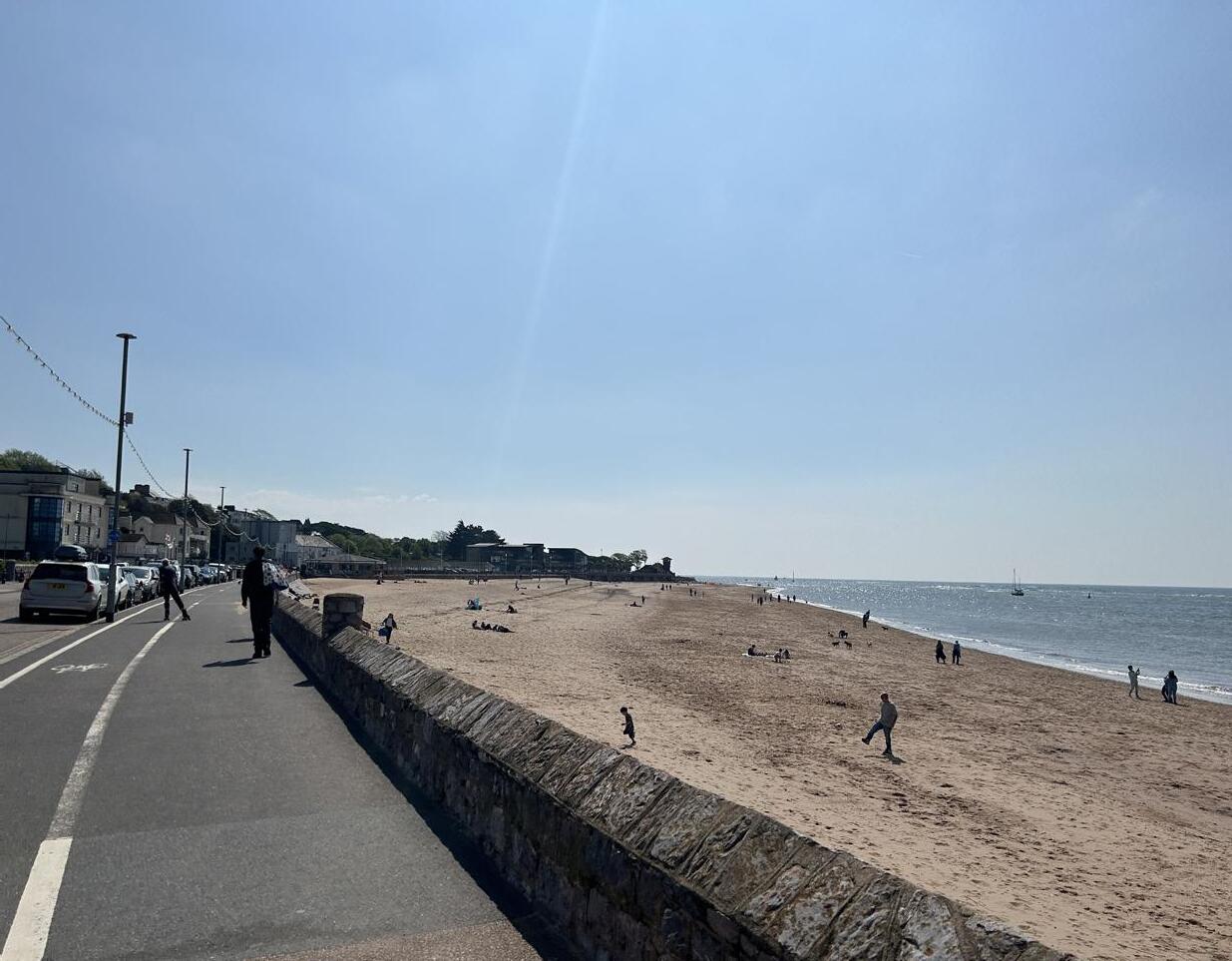
EXETER students have joined a growing global movement of pro-Palestinian student activism after establishing the Exeter Liberation Encampment for Palestine (ELE4PAL) on campus earlier this month.
At 4am on Tuesday 14th May, protesters set up the camp on the green opposite the Queens Building. This featured a cluster of tents on the green, alongside banners displaying slogans such as "Divest from Deadly Research", "Boycott Tel Aviv Uni" and "The People Stand with Palestine." At the time of publication, this had grown to approximately 30 campers, according to the organisers.
The encampment follows a similar pattern of student-led protests that began in American universities such as UCLA and Columbia in April and has since spread to the UK since the start of the summer term, including Oxford, Cambridge, Manchester, Bristol, and now Exeter.
In a statement issued on the encampment’s Instagram page on the 14th May, the group stated that they were “protest[ing] the University’s complicity in the ongoing Israeli occupation and genocide of the Palestinian people.”
They issued a list of four demands, calling on the University to:
• “boycott Israeli universities and research partnership programmes”;
• “support Palestinian education by offering at least one scholarship in each department for students/ scholars from Gaza, and establishing partnerships with Palestinian universities to collaborate on rebuilding education in the Gaza Strip”;
the windows of the meeting venue whilst chanting “disclose, divest, we will not stop, we will not rest.”
As a result of this action, the group met with Mike Shore-Nye, the University’s Senior Vice-President and Registrar & Secretary. In a statement issued on ELE4PAL’s Instagram page, they claimed that Shore-Nye “insisted that negotiations take place through the Students’ Guild”, to which the group responded that “representatives of ELE4PAL must be at the negotiating table in direct dialogue with the University’s management.”
They went on to say that the University will issue a response to their demands within the next week. This has not yet been issued at the time of publication.
The protest at the Holland Hall meeting is one of a number of actions taken in recent weeks by ELE4PAL.
On the 21st May, supporters of the group disrupted a leadership seminar chaired by Stuart Brocklehurst, the Deputy Vice Chancellor for Business Engagement and Innovation, accusing his department of partnering with multiple companies dealing in Israeli arms.
On the morning of the 23rd May, ELE4PAL then staged a die-in in and outside the University’s reception.
Exeposé spoke to the encampment’s media spokesperson, Chris Kunzler, on the 21st May, who stated that “we’ve been dialoguing with the University for about six or seven months now. Nothing has been done. They won't listen to our demands.” He called the camp a “form of escalation and making a point to the university that we are willing to commit to this, and we won't go until our demands are met.”

• “safeguard the protection of academic freedom and freedom of speech for students, staff, and allies engaging in supporting Palestine.”
The group have pledged to remain until their demands are met, or at least until the University opens a dialogue with them to discuss these demands.
On the 22nd May, the protesters disrupted the annual council and senate meeting of the University’s senior management at Holland Hall. They held up banners to
intimidating, abusive, threatening or illegal language, and not to disrupt University business or events. He pledged that the University “will do everything we can to ensure that upcoming exams and other vital University business is not impacted”.
This reflected concern among some students that the camp would disrupt their summer exams, with one student telling Exeposé of “lots of excess noise during my exam in Queens” and another that “their loud activities are rather distracting when I’ve had meetings in Queens. The drums last week could be heard during my friend’s exam.”

establishment of the encampment.
This was recognised by the protesters who, on the 17th May, shared an Instagram story telling students that “if your exams have been disrupted, please direct your annoyance to the University.”
Responding to these concerns, Chris Kunzler said, “we're not here to harm you. It's this university [that] has failed us all. Whilst we are talking about Palestine now, this is a much wider thing. […] This is about accountability, and even the demilitarise and divest stuff pertains to a wider issue of this university being unable to commit to policies that it promises us and that it preaches.”
“To people who feel that their thing is disrupted, that is not the point of what we're doing. And thus far, I don't think in any way we've done that, I think it's just the university more trying to make it seem as if we have.”
Kunzler went on to state, “I know that their position is claiming that they're supportive of it, but thus far, they're completely ignoring us in terms of dialoguing and that's what we want.”
On the day the encampment was established, Mike Shore-Nye issued an email statement to all students, stating that “the University’s primary role is to ensure the safety of our colleagues and students, and to safeguard the freedom of speech and expression and academic freedom for all members of our community.”
Shore-Nye also listed several requests that the University had asked the protesters to follow, including not blocking access routes; not using
Indeed, Kunzler felt that the reaction of the wider student body was “predominantly supportive [with] very little negative interaction”, describing how “students and staff have come up and they've helped with things like cooking, brought us food, and have just wanted to support in a lot of ways.”
He argued that “if it was actually put to the wider student body, the vast majority of us, beyond even the people who are camping, would say, no, I don't feel comfortable having relationships with military institutions, I don't feel comfortable with how unequivocal the support is for Israel.”
This reflects the views expressed by the 30 students who responded to a survey conducted by Exeposé, with 70 per cent stating that they either strongly or somewhat support the
One student told Exeposé that, “I didn’t realise how complicit the university was in funding the genocide in Gaza until I saw the posts from the encampment’s Instagram. The protests are annoying but that’s the point, otherwise these people in management will continue blindly with the status quo.”
This reflected a commonplace sentiment, with another stating that they “hugely support [the protest], it’s a brilliant endeavour in showing solidarityandencouragingdivestment, [it’s] entirely justified and extremely principled on the students’ parts.”
There was some ambivalence and outright opposition expressed by a minority of students, primarily focused on disruption to exams. One student called it “pointless virtue signalling” and another argued that “they are not accomplishing anything productive except wasting their own time.”
The University’s Israeli and Zionist Society have expressed more outright concern about the encampment. They told Exeposé, “Jewish students are feeling unsafe on campus when protests are giving platforms to genocidal chants, calls for violence and glorification of groups which have the killing and harming of Jews within their doctrine.”
“The right to protest is not disputed, nor is expressing solidarity with innocent Palestinians caught up in war. But what these encampments have done, is bring unprecedented levels of hostility and intimidation to Jewish students and the evidence of antisemitism we have seen tells us time and time again that Jewish students have valid reason in feeling that their campuses may be very scary places at times.”
The Society called on the
University to “do all it can to safeguard its Jewish students.” They went on to say, “This is not about making any political claims, nor about curtailing the rights to protest […] This is about the safety and security of Jewish students — who are feeling more vulnerable than ever.”
When asked about these concerns by Exeposé, encampment spokesperson Chris Kunzler stated, “no one here is an antisemite, no one here hates Jewish people. People feel ire towards the state of Israel and Zionism because of the consequences that it’s had for Palestinians… if some people feel uncomfortable, I’m sorry, but I’m never going to be able to change their minds.”
Meanwhile, a spokesperson for the University of Exeter told Exeposé, “We will always stand in support of the rights of our students, staff colleagues, and members of the community in exercising their legal rights to free speech, including protest. We will continue to support all students, groups and campaigners impacted in any way by the current circumstances to ensure the safety and wellbeing of all involved.”
The Guild Officers also issued a statement on their Instagram page on the 17th May, which called “for peace, for justice, [and] for an end to the violence and suffering in Palestine.” A spokesperson for the Guild expressed similar sentiments when asked for comment by Exeposé, saying, “We will always stand in support of the rights of our students, staff, colleagues, and members of the community in exercising their legal rights to free speech, including protest.”
“We will continue to support all students, groups and campaigners impacted in any way by the current circumstances to ensure the safety and wellbeing of all involved.”
RESIDENTS have called for Exeter City Council to take greater action over the dilapidated state of the iconic Exeter Guildhall.
For 800 years the historical Guildhall has been a landmark on the High Street; however, it has fallen into disrepair in recent years. With a leaking roof, damaged façade and crumbling throughout the building it is a far cry from the monument that
has been a police station, host of mayoral banquets and exhibitions.
With the Guildhall identified as being of outstanding architectural interest, the council is being forced to take urgent action to prevent further dilapidation.
Exeter City Council have a statutory requirement to maintain the Guildhall as it is a Grade II listed building. However, residents have expressed concern that the council have not taken enough care or diligence in maintaining it and are very worried for its future.
When asked about the
maintenance of the Guildhall an Exeter City Council spokesman said, “The council has recognised the ongoing issues in this area and is in the process of appointing a specialist consultant to determine a suitable approach to the ongoing preservation of this asset.”
The Exeter Guildhall is the oldest Guildhall in the country still used for its original purpose and still is host to civic functions/weddings, receptions, full council meetings, banquets and exhibitions, and is available for private hire.

BETWEEN the 16th-18th April, the University of Exeter hosted the annual Digital Universities UK conference, working with industry leaders to showcase and challenge the way universities run. The event itself consisted of several workshops, conferences, as well as a start-up village for attendees to hear about the latest tech innovations.
Across over 50 sessions the event sought to cover four core themes including: Leadership for a smart, sustain-
Lable campus, digitally transforming the research experience, human-centred student experience and teaching, learning and assessment innovations. The event notably raised discussions about AI, analysing the pressures felt by academics across the past 18-months and questioning how we can work with artificial intelligence and use it to our advan tage. These concerns were once again highlighted during the first day when the winner of the Start-up

competition was announced as Tutello. A start-up company working to “maximise the benefits of integrating human support with AI to provide ondemand, quality tutoring.”
Towards the end of the weekend, events included enabling international and interdisciplinary collaboration in research with digital tools and a talk sponsored by Turnitin about Navigating academic integrity in the age of generative AI. Some of the other partners during the weekend included
Adobe, Studiosity, Kaplan, Future Learn and Kortext. The weekend also included around 180 speakers from several different companies, organisations and universities, including speakers from the University of the Arts London, the University of Exeter and Times Higher Education (THE).
In response to the event Professor Lisa Roberts, President and ViceChancellor of the University of Exeter, said: “We were thrilled that the University of Exeter was able to host the Digital Universities UK conference and welcome digital and technology leaders from across the country.” She went on to comment that “the conference gave Exeter a fantastic opportunity to
showcase how we have developed a digital strategy not only to inspire and create a greener, healthier and fairer world for everyone, but also to prepare everyone across our community to succeed in their chosen fields and future careers.” She further stated that the University designed our approach with students, for students. Collaborating closely with partners and policymakers, the higher education sector may effectively leverage the substantial potential of digital transformation for our research and teaching endeavours. She emphasised how events such as these are essential for fostering innovation and forming deeper ties.
“Its worked out that a couple of train tickets a week is a lot cheaper than renting”
ABOUR'S stance on rent control remains cautious, mindful of criticisms that strict controls could deter new housing developments. Despite internal pushes for tougher measures, the party has distanced itself from the report's findings, seeking a balanced approach.
The impact of the reform and concerns surrounding renting have been voiced by students throughout the past year as rent prices continue to soar in Exeter amongst other student cities. For students, these reforms promise significant improvements
in housing security and affordability. The abolition of no-fault evictions would mean students can stay in their rented accommodations without fear of sudden eviction, allowing them to focus on their studies. Provisions ensuring HMOs remain available for student rentals also address the cyclical nature of student housing needs. The anticipated reforms aimed at creating a fairer rental market will have to wait for the next parliamentary session. This is despite statistics from landlords organisations indicating that “87 MPs are landlords,

including 68 Conservatives.”
The growing delay in passing the Renters (Reform) Bill leaves these benefits unrealised. Students will continue to face uncertainties in the rental market, especially with the rising trend of rent increases. Given these growing uncertainties, NUS UK Vice President for Higher Education, Chloe Field responded to the matter stating that “The student housing market is broken, as is our higher education system” and went on to criticise the lack of support offered “other than the occasional top up to hardship funds.”
In our edition last June, we spoke to students who drew concerns surrounding the lack of security in contracts and the ability of the University to lend support. At that time, the bill would have left purpose built accommodation immune from these changes with students in mind, yet now this promise remains uncertain.
Exeposé interviewed Katie Truman, a student studying a Masters in Public Policy who shared concerns surrounding the impact of the bill on students. She commented that “I can’t afford to rent in Exeter, when I have seminars I travel for St. Austell in Cornwall (my family
home). It’s worked out that a couple of train tickets a week is a lot cheaper than renting.” Reflecting on her undergraduate degree, Truman noted that a rent increase of £20 weekly led to her decision to cease renting altogether. She further stated that having to commute due to rising rent prices in Exeter as well as balancing the pressures of a degree alongside socialising and having shifts at work had taken a toll on her mental health. Finally, in response to the Renters Reform Bill she addressed that “it doesn’t include University students, which is ridiculous, because they make up a huge proportion of renters in the UK.”
The Students’ Guild have responded that their advice team are always there to support students with questions or concerns surrounding the Bill and that they can book appointments with one of their advisors. In particular, they highlighted that a “recently released Russell Group Manifesto (chaired by our Education Officer Alex Stanley) includes calls to strengthen legal protections for student renters, improve standards of housing and hold landlords more accountable” as they know that “this is an issue of concern to students,
so we are working with the Russell Group to lobby for real changes.”
The University shared a similar sentiment, responding directly to financial concerns raised by the uncertainty of the Bill. A spokesperson stated that they have “worked with our student representatives to introduce a wide range of measures to support our students. We continue to offer a range of accommodation at various contract lengths, types and prices whilst also investing in improving facilities and accommodation.”
They also drew attention to the launch of an Accommodation Bursary that provides a meantested payment to students to assist accommodation costs.
The Renters (Reform) Bill represents a significant step towards improving housing stability for students and other renters. While its delay is a setback, the ongoing discussions and proposed amendments indicate a strong push towards more robust tenant protections in the future. As students continue to navigate the challenges of the rental market, these legislative efforts provide a glimmer of hope for a fairer and more secure housing landscape.




After three amazing years as part of this publication, despite writing constantly — I find myself struggling with the words to say a final goodbye. This paper has brought so many amazing experiences, opportunities and lifelong friends, for which I am forever gratefu l. I’d like to thank every writer, reader and committee member for all their hard work this year — especially to my amazing co-Editor-in-Chief Livvy. Exeposé has been a fundamental part of my uni experience and I know it will continue to hold a special place for many students to come . While the thought of leaving seems bittersweet to us all, I’m sure the future will be bright, and I look forward to seeing what every one gets up to!
Livvy Mason-Myhill — Editor-in-ChiefThese past three years being on the Exeposé committee, going from News Editor as a little fresher, to Deputy Editor as a second year to Editorin-Chief in my third year, has truly shaped my university experience. I have honestly enjoyed every second of it and it’s fuelled my passion for journalism even further. I would like to thank my amazing co-Editor-in-Chief Anabel as well as every editor, writer, proofer and contributor who has helped to make the paper as brilliant as it is today. Flourishing my journalistic skills by reporting and writing on some incredibly impactful stories has been extremely rewarding. I cannot wait to see what the future brings and this publication truly has meant everything to me. We did it!
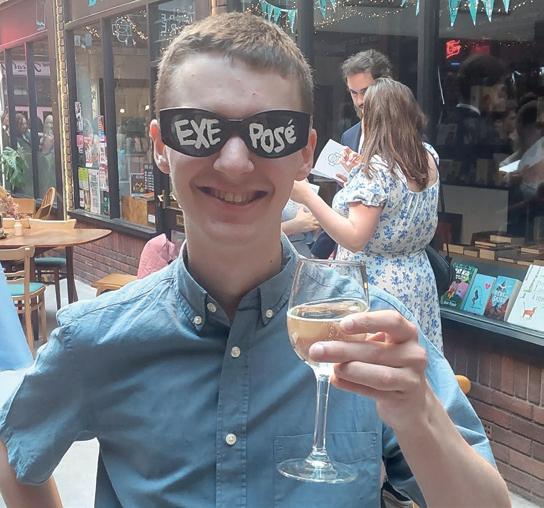

Starting out at Exeposé at the end of my first year felt so scary, but two years on it’s become the best thing I’ve done at university. It’s helped me to make friends, keep busy, and figure out my future plans. I still remember my first day as Music Editor in December 2022 (shout out to Gracie for being the first Exeposé friend I made on that day!), and it’s been a privilege to now feel like such a valued member of the team, particularly since stepping up as Deputy Editor this year. Journalism will hopefully always be part of my life, and Exeposé will forever be where it all began! Thank you to everyone and good luck Gracie and Amy!
Hello, Exeposé , what is Exeposé ? Exeposé is a family, a passion, way of life, it is something so perfect, so sacred, like a church. But much more than a church, it is not just about a devotion to holiness, but to friendship, to journalism, and to love. What is anythin g in life if not about love? So true queen. Thanks to all the people who have been there with me, I will never forget ya’ll . Peace and love — Joshuaaa.
*DISCLAIMER: Josh wrote this under the influence from Venice so will probably be extremely embarrassed by what he has put here.


Being Finance Executive for Exeposé has been a great experinece as a FCH Mathematics and English student. Without the finance, the amazing content that writers and editors create wouldn’t be possible; I feel very lucky to be a part of the publication in this way. I’d like to thank the senior team for being so collaborative with me, I look forward to seeing what everyone does in their next steps.
Being a part of Exeposé has been an unforgettable part of my Exeter Uni experience. Living in a flat with two editors it became a bi-weekly ritual to read and discuss each paper, seeing the amazing level of creativity and talent every writer brings, and then sticking our wo rks onto the walls for prospective tenants to admire. Exeposé and XMedia are such great communities of which I’ve made friends for life being a part of. It’s thereby been an honour to give back to this community I love during my tenure as Events Executive, creating experiences that I’ll remem ber fondly.


If there’s one thing I’ve learnt from Exeposé , it’s to just go for things. It never occurred to me that I could be an Editor, but the paper has become the centre of my university experience and I’ve truly enjoyed every minute. I’ve learnt so much and met so many inspiring people. Highlights? The camaraderie in the office, getting a preview of each issue at proofing sessions, and interviewing the cricketer John Turner . Lowlights? None really, but it’s slightly embarrassing that I wrote just one article for my first section, print Features — and that was two co mmittee roles later!
Since November 2022, Exeposé has been a great experience. From interviews with politicians, the section has been a perfect experience to learn more about journalism and to develop writing skills. There have been numerous highlights. One was interviewing Jermey Corbyn. Another was publishing a campaign on type 1 diabetes awareness which led to changes within Exeter University’s setting. But above all, being an editor at Exeposé has provided the opportunity to feel part of a team. It has been a great leveller in that sense. Every article, interview, and content call has been an experience, and one which I won’t f orget.
Henry Parker — Features Editor
Being a part of Exeposé is not something I ever imagined for myself, but for what is was, I did enjoy my time as an editor. I reckon I’d do it again, given the chance — which, coming from me, is just about the highest praise I can give something.
Harry Craig — Deputy Editor Willow Cracknell — Finance Executive Oliver Lamb — News Editor Benedict Thompson — Features Editor Joshua Smith — Deputy Editor James Allen— Events Executiveresults of the local elections across the UK
THE local elections across England at the beginning of May (the final democratic contest before the 4th July general election) marked yet another sign of electoral weakness for the ruling Conservative Party and strength for their progressive allies across both council and regional elections.

Another sign of electoral weakness for the ruling Conservative Party
The elections, which took place on the 2nd May, saw the election of 2,600 councillors, 11 directly elected mayors, and 37 police and crime commissioners (PCCs), as well as elections for the Greater London Assembly. An additional election was a parliamentary byelection in the constituency of Blackpool South. The constituency, which had voted for the Labour Party for over 20 years before voting for a Conservative along with much of the industrial north in the 2019 general election, elected Labour MP Chris Webbe on a swing of 26 per cent. The by-election was called in the wake of a scandal involving incumbent MP Scott Benton, who was recalled in the wake of a scandal in which he was caught offering lobbying services for payments, including for the gambling
“Things
Iindustry. This was only the start of the Conservatives’ troubles from the election’s fallout.
The Conservatives lost almost half of their overall councillors (474) and control of 10 of their 16 councils. The party performed so poorly that they came third in terms of councillors elected behind Labour and the Liberal Democrats — the first time this has happened since the 1996 local elections. The Conservatives’ losses were felt evenly across England. In the north, the councils of Dudley and North East Lincolnshire fell from Conservative control to no overall control while Labour regained their majority in Hartlepool which they lost in 2021. In the south, the Conservatives lost control of some of their former heartlands, such as Adur and Rushmoor. However, the council results were not merely a story of Conservative losses and Labour gains. Many areas saw an increase of an independent presence in areas such as Rochdale and Oldham which saw a pro-Palestinian protest vote against how the main parties have handled the recent conflict in Gaza. There was also a marked increase in Liberal Democrat support as they gained over a hundred councillors and control of Tunbridge Wells Council and Dorset Council, though they came short of control in Gloucester and Wokingham.
In the mayoral elections, Labour successfully defended all of their incumbents, won all newly
formed mayoralties and defeated West Midlands Mayor Andy Street by just over 1,500 votes in what became the election’s marquee race. Labour also successfully gained 10 PCC positions across the country including in southern areas such as Norfolk and Avon and Somerset. This is despite recent changes to the voting system for PCCs which allowed candidates to be elected on a plurality of the vote, splitting the anti-Conservative vote between Labour and the Liberal Democrats and allowing the Conservatives to win on a relatively small percentage.

Labour also successfully gained 10 PCC positions across the country
Despite the mass losses of the Conservative Party, psephological scholars have disagreed on what the results mean for the general election in six weeks time. Professor Michael Thrasher (an honorary professor of politics at the University of Exeter) calculated the national vote share from the results and estimated that Labour would be the largest party but fall short of a majority by 32 seats. Meanwhile, Professor Sir John Curtice has suggested that the Conservatives are on course for a large defeat, in part due to the heavy losses in coun-
only get wetter”:
cil seats and the relatively large swing in what were previously the safest Conservative wards. While there remains some debate as to the significance of the results, the local elections confirm a stubborn trend of Conservative unpopularity and weakness which seems unlikely to dissipate before the upcoming general election.

Harry Craig, Deputy Editor, covers the early days of the general election campaign ahead of the 4th July poll
T was a particularly conspicuous way to kick off a general election campaign. Last Wednesday, Rishi Sunak stood on the steps of 10 Downing Street to call a general election for Thursday 4th July, with his suit getting progressively soaked by the pouring rain whilst D:Ream’s ‘Things Can Only Get Better’, the anthem of New Labour’s 1997 election landslide, was blared on loudspeaker by protester Steve Bray (better known as ‘Stop Brexit Man’). This was likely not how the Prime Minister wanted to begin six weeks of campaigning, as the embattled leader faces an uphill battle of overturning a 20-plus point deficit in the polls by the 4th July. The events of the first few days after the election was called suggests Sunak is not making his job any easier — from a gaffe at a Welsh brewery to a campaign visit to the Titanic Quarter (cue the obvious jokes). You have to question if Sunak actually wants to win this election. It seems extraordinary that this election has been called in the first place. It was just two weeks ago that the Prime Minister promised the panellists on Loose Women that there wouldn’t be a summer election. Given Sunak didn’t have to set a date until December at the latest, and all polling suggests Labour are set for a landslide, all serious commentators viewed an autumn election as most likely, to provide the Tories with the longest possible time to overcome Labour’s lead. Yet on the morning of the 22nd May came the announcement that inflation had fallen to 2.3 per cent, its lowest level in almost three years and close to the Bank of England’s two per cent target. Of course, it’s unlikely that this alone provoked
Sunak to call the election, but it provided the backdrop for Sunak to trigger the 4th July polling date. General election campaigns are weird things, and the next five weeks will throw up unexpected moments and shocks (who can forget Gordon Brown calling a Labour supporter a “bigoted woman” in 2010?). However, it will take an act of God for this campaign to be anything more than a victory lap for Sir Keir Starmer’s Labour Party.

it will take an act of God for this campaign to be anything more than a victory lap for Labour
The Conservatives have not led an opinion poll since the 6th December 2021, and every single poll has suggested they are well over 20 points behind Labour. This would give Labour a huge landslide, exceeding a 200-seat majority — Survation’s MRP poll in March even put the Tories under 100 seats. Labour is significantly aided by its resurgence in its former Scottish heartlands, as the oncedominant Scottish National Party have become engulfed in scandal. Meanwhile, at the other end of the country, the Liberal Democrats are capitalising on middle-class discontent in traditional Tory safe seats in the south – although their polling numbers have remained stagnant since 2019, they are set to topple the Tories from Tunbridge Wells to Newbury, Taunton to Cheltenham.
An intriguing question remains as to how the student vote will be distributed, given that the elec-
tion falls right in the middle of the university summer holiday. This may mean that students (who are disproportionately likely to vote for progressive, leftleaning parties) vote at their home, rather than termtime, addresses. Therefore, rather than voting in safe urban Labour seats, many more students will be voting in rural, traditionally conservative areas — perhaps even more detrimental to the Tories’ fortunes. Of course, for students to have any effect on the election outcome at all, the most important thing to do is to register to vote. To vote in this election, you must have registered by the 18th June at 23:59 BST,
and it is simple to do so (www.gov.uk/register-tovote). Students can register at both their home and term-time addresses, but can only vote in one, and you can also apply for a postal or proxy vote if you are unable to make it to the polling station on the 4th July. Whatever the next five weeks of this general election campaign brings, and barring an unprecedented disaster for Starmer, the likelihood is that we will have a new Labour government in power when millions of Britons wake up on the 5th July. After 14 years of Tory government since 2010, does a new British political era beckon?

MARKO Luchka, a Ukrainian student, says, “The first thing I do when I wake up is check whether there was any bombing near my friends in Kyiv.” Born in Lviv, Marko moved to Kyiv at a young age. Before the war, Marko spent much of his time there, but left to study in Britain. Like many Ukrainian students, he was studying in Exeter when the war broke out in 2022. Marko is finishing his second year and is studying Economics.
Western support is vital in assisting Ukraine. A £50 billion military aid package was recently announced by the US to help Ukraine endure and prevail. For Marko, this kind of support is vital to prevent recent situations such as the recent offensive in Kharkiv from occurring. At the same time, this aid has come after a period of stagnation; “that is too slow for something as quick-moving as a war”, Marko explains.


than that”. “When you live there and you listen to it, you close your eyes. It is absurd.” Historians say the claims made by Putin are nonsense, representing nothing more than a selective abuse of history. Marko has similarly seen new history textbooks in Russian which have manipulated history to justify the invasion.
Societies and networks are important amongst Ukrainian students. “The war has made me get involved in Exeter University’s Ukranian Society. It became something much more important to me and I wanted to do what I could to help,” Marko explains. Exeter’s Ukrainian Society has put on recent events around first-aid, stands around the Forum picturing current events, and is in close talks with the Devon Ukranian Association. It becomes clear that this strong sense of community is felt amongst Ukrainian students across Britain. Marko tells me that in many places across Britain, in Glasgow and Nottingham, his friends from home have further set up Ukrainian societies. They, too, have come together.

But in addition to recent developments, Marko is also aware of the deceptiveness of Putin’s justification of the war. “The Tucker Carlson interview was one of Putin’s ramblings. Nothing more
This kind of support is vital to prevent recent situations such as the recent offensive in Kharkiv from occurring It becomes clear that this strong sense of community is felt amongst Ukrainian students across Britain
After the invasion, many universities including the University of Exeter participated in the Homes for Ukraine scheme. The most important help for Marko has been financial, such as the Ukraine Extension Scheme, which has offered Ukranian students the possibility of paying home fees. As of 14th May 2024, 257,600 visas have been issued to Ukrainians. Marko describes this support as fundamental.
The war on Ukraine continues to rage on. A
land of liberty continues to remain a country in captivity. As some Ukrainians remain behind, they battle with the constant reality of being at war. While you might expect people to leave, this is not the case for some in Ukraine. Marko explains that often the grandparents within families have stayed behind. “People love their city and love their country. People in these cities don’t move out because they love their homes more”. They remain courageous.

THE 45th President of the United States, Donald Trump, has been served with another legal trial, this time concerning a series of hush-money payments. A controversial figure worldwide, this trial locates itself across a series of other legal proceedings that he has found himself involved in since leaving office in 2021. Due to the political position of Trump in the 2024 presidential elections, this trial has been followed with significant public and media interest, becoming a highly anticipated event. This case revolves around President Trump when he allegedly made payments silencing individuals about extramarital affairs during the 2016 presidential campaign. So far the legal proceeding has revealed a network of testimonies and affairs that have spotlighted specific issues surrounding personal conduct and political accountability. Together, this case sees Trump facing 34 charges of falsifying business records to conceal the hush-money payment made to an adult film actress, with an array of potential witnesses and legal figures becoming involved with this case.

This case sees Trump facing 34 charges of falsifying business records
To view the key developments of this trial so far, it is important to understand the individuals that play a crucial role in this case. Stormy
Daniels, an adult film actress whose real name is Stephanie Clifford, has taken centre stage with this case, as she claims she had an affair with Trump in 2006 and was subsequently paid $130,000 by Trump’s former lawyer to keep quiet about the encounter before the election in 2016.
Trump has categorically denied these allegations, with his defence based on the reasoning that these payments were connected to his campaign and the affair never took place. Accused of making these payments, Michael Cohen, the former personal lawyer to Donald Trump, has already previously pleaded guilty to federal campaign finance crimes in 2018, admitting the hush-money payments were made by the direction of Trump. Cohen’s testimony has been a focal point in the development of this trial, alleging that Trump reimbursed him through payments that were falsely recorded as legal expenses. Calling him a liar, Trump’s legal team has attempted to block his testimony, adding to the contention towards the credibility of Cohen due to his previous conviction for lying to Congress and other offences. Other key characters have been central to the proceedings, helping with the developments of the case so far. Former CEO of American Media Inc. (AMI) and publisher of the National Enquirer , David Pecker has played a crucial role in being the first witness, detailing his “catch-and-kill” strategy in buying and burying negative stories about Trump. Allegedly receiving $150,000 from AMI to silence her, former
Playboy model Karen McDougal portrays another key testimony to this trial, further claiming she had an affair with Trump in 2006-2007, which Trump has denied. Others have been involved in the turmoil of suppressing stories, with Hope Hicks, a former White House aide and Trump confidante, being accused of their involvement and has been mentioned frequently during this trial.
As the trial has developed, crucial documents linking Trump to these hush money payments have been presented by the prosecution, with his defence claiming that these payments were to avoid family embarrassment, not influence the presidential election. Witnesses and experts, including Trump Organisation executives and campaign finance specialists, have all provided key testimonies on the legal and procedural aspects involved across this trial.


Crucial documents linking Trump to these hush money payments have been presented
Many political and public implications have been given since this trial, given the status of Trump as former President and a leading figure in the Republican Party. Supporters of Trump have viewed this as a politically motivated at -
tack which is aimed at derailing his future commitment to the 2024 Presidential elections. As this trial unfolds and develops further, time will tell the outcome of the situation and the political position Trump will find himself in when it comes to the Presidential Election later this year.
THE Indian elections are well under way, as the world’s largest democracy heads back to the ballots. The incumbent Prime Minister Narendra Modi is looking for an historic third term as the country’s leader, after announcing his campaign in the holy city of Varanasi, where he is MP for the Bhartiya Janata Party (BJT). He is going up against the Indian National Congress (INC) who have yet to pick a candidate for PM, as polling continues in the six-weeklong elections that take seven electoral stages.
Modi must secure a majority of the 543 seats in the lower house, the House of the People, to win
the election. Whilst the BJP remains popular in the northern states where the majority of the population and electoral seats reside, Modi is looking to further extend his majority by winning over the five southern states that make up 31 per cent of the country’s wealth. Meanwhile, he must appeal to the farmers of Hyderabad, Punjab and Western Utter Pradesh in order to secure those crucial northern states, as farmers’ unions have twice gone on protest in New Delhi, against Modi’s policies in his last term. He will need to appease the majority of the population to secure the crucial northern states, whilst showing greater appeal to the wealthier states in the south.
AN unexpected flood has hit parts of Rio Grande de Sol in southern Brazil, leaving at least 95 people dead and 276 people injured with hundreds of thousands displaced from their homes. As well as the human toll, there has been significant damage to infrastructure, with the floods submerging houses, and blocking roads and transport, making it difficult for residents to evacuate.
Families have been relying on canoes and
inflatable rafts to evacuate, whilst some families have refused to leave despite weather warnings. Access to water has been cut off as five of the six water treatment plants ceased operations. The army has been called in to provide those affected with food, medicine, and shelter while the search continues for the 130 people still missing. However, these efforts have been affected by heavy rainfall, limiting the scope of search and rescue operations. The region remains on high alert.
Megan Hall reflects on the infamous international singing contest
THE Eurovision Song Contest Final 2024 was hosted by last year’s winning nation, Sweden, for the seventh time, coincidentally on the 50th anniversary of Swiss supergroup ABBA’s historic Eurovision win. Malmö Arena was sure to deliver a memorable evening to audiences across the world. Ahead of the evening’s events, Dutch delegate Joost Klein was disqualified due to allegations surrounding an incident backstage. Klein had been a favourite to win the contest. The remaining 25 entrants took to the stage, as Graham Norton guided UK viewers through the events of the evening; pyrotechnics, partial nudity, and a stuffed one-eyed cat were but a fraction of the excitement that the Eurovision Final delivered.
Demonstrations in Malmö responded to the ongoing war in Gaza, with pro-Palestinians advocating for Eurovision to be boycotted for its inclusion of Israel. Several nations (namely Finland and Norway) had spokespeople withdraw due to the controversy. Israel’s Eden Golan was met with booing and cheering on stage, and she placed fifth overall.
Finland’s Windows95Man appeared partially nude, with
props preventing him from exposing himself to viewers. Concluding by skipping on a rope of pyrotechnics, Finland’s scandalous performer gained 19th place at the end of the night.
The UK’s Olly Alexander’s performance of ‘Dizzy’ depicted him in gravity-defying positions to television viewers, which ultimately placed him in 18th place. Joanna Lumley announced that the UK jury backed Portugal, but the contest’s overall winner was Switzerland’s Nemo. Nemo’s impressive falsetto during their performance of ‘The Code’ secured Switzerland as the host nation of Eurovision 2025!

Florence New explores the future of inclusive space missions
JOHN McFall, a former British Paralympian, has been participating in a parastronaut feasibility project called ‘Fly!’. A motorcycle accident at the age of 19 led to the loss of McFall’s right leg, who has since become a Paralympic medal-winning sprinter and orthopaedic surgeon.
McFall has been training with the European Space Agency (ESA), selected to test the safety of ac cessible space travel. This is the first example of such a project. Joining the scheme required extensive psychological, technical, and professional tests, and disabled candidates were only considered if they had

lower limb deficiencies or were less than 130cm tall. A total of 17 prospective astronauts make up the ESA class of 2022, selected out of more than 22,500 applicants from across Europe. There is no promise that McFall will enter space, as he is a reserve astronaut, but vital information has been gathered thus far about the operation of his prosthetic leg. For example, it was found that if McFall was to make the flight, it is likely several different prosthetic legs would be necessary. The ESA is planning to land its first astronaut on the moon before the end of this decade.
EARLIER this month, Exeposé sat down for an exclusive interview with Amelia Jones, the co-Social Secretary of the University’s Welsh Society!
GM: Hello Amelia! Can you tell us a little bit about Welsh Society and the kind of things that make it special?
AJ: So Welsh Society is a community for Welsh people in Exeter. There are a lot of Welsh people in Exeter and we have around 200 members. We love themed socials such as the sheep social, and this year, the Saint David’s Day social, which had never been done before. We also have Gavin and Stacey socials. Families in Welsh Soc are little groups within the society where we meet up and it’s all very community-driven! You can connect with people who may even just live down the road from you.
GM: I didn’t realise there were that many members! And can you tell us what your favourite memory of Welsh Soc is so far?
AJ: Dressing up is so fun and in Exeter, normally socials are sports-driven so this is refreshing. I really like the Gavin and Stacey social. Last year we went as Dave Coaches. I went as Dave and Amy went as the coach!
GM: The pictures of that were iconic. Do you know if Welsh Soc has anything lined up for next year in the way of socials or events?
AJ: This year has been busy with Amy and I as social secs and we’ve tried to have a social every two weeks so I’m hoping that will carry on with Amy as President. Also, every year, we go to either Edinburgh or Dublin for the rugby and next year is Edinburgh. I’m just hoping that they carry on the socials that we’ve come up with like the dress as your type social, Gavin and Stacey or MILFs and DILFs on tour. And obviously the Saint David’s Day social!
GM: Yeah, I’m sure it will! And what does Welsh Soc do in order to foster inclusivity among its members?
AJ: As I said, we have the families which are very inclusive. We come together to do family socials as well. With our TikTok, people who aren’t even Welsh will come! A lot of people who come are only half Welsh and they enjoy being part of it and embracing their Welshness.
GM: And finally, what advice would you give to someone who’s tentative about joining a country-specific society?
AJ: I think some people assume it will be like a cult and is dubious. But I think that through TikTok, we’ve shown how inclusive it is in Welsh Society and how you can dress up and do all these weird things and everyone in the whole society is so supportive. Really, we’re like one massive family.
GM: Of course, that’s fantastic. You heard it here, get involved!


Contributing and editing Exeposé in my final year has been a truly rewarding experience that I will value in years to come. The International section is one that is still in its early years but has become a vital part of the paper. I am happy to say that Exeposé has become an integral part of my Exeter University experience!
I’ve absolutely loved being Exeposé ’s Print Comment Editor this year! Working with Lisette and the rest of the print team has been such an amazing opportunity. We’ve both had so much fun coming up with prompts and reading all the fantastic writing coming our way. Working as an editor for Exeposé has been one of the best experiences of my time at Exeter. The wonderful people on the team all helping each other and laughing along the way has made all the late nights and struggles with InDesign such a pleasure and so worthwhile. My one regret is not having joined Exeposé earlier. Wishing the future Print Comment editors all the best for next year!


I am so grateful for my time as Lifestyle Editor during my final year at Exeter. Gaining this responsibility in the world of st udent journalism has enabled me to explore fresh avenues of learning that would not have been so easily available to me otherwise: this includes growing my editorial skills through utilising Adobe InDesign and Photoshop and developing my confidence in putting forward meaningful stories that enable our writers to delve into their own lifestyles and find fun in such creative lib erty. My role at Exeposé has been an instrumental part of my university experience — a role that has only solidified my aspirations to pursue a career in journalism. I cannot wait to deepen my journalistic experience in the near future!
Working on the Arts and Lit page with my co-editor Lauren has been an amazing experience. From writing articles and creating pages about our favourite books, thanks again Brandon Sanderson, to reviewing the weirdest books we can find, thank you again The Cock Down the Block, I have loved every article that I’ve written and read. One of the highlights is seeing various theatre shows. Our favourites were the pantomime and anything by the phenomenal Le Nevet Bete, because ‘London needs dick tonight’ was possibly the funniest theatrical bit we’ve ever seen. While I’m sad to leave Arts and Lit, I know next year’s editors will do a fantastic job and make us proud.


I’ve spent two years on committee for Exeposé , first as administrative executive and then as Arts and Lit Editor, and I’ve loved every second. In particular, I have enjoyed the perks of press tickets to shows at the Northcott theatre and by acting societie s, but even just hanging out in the office during press week is a lot of fun. Everyone is so lovely, and I’ve made great friends (shout out to my Arts and Lit co-editor Maddie Conlan, who will continue to terrorise me with her reading choices for years to come). I hope to continue to be involved with Exeposé when I return to Exeter after my placement year!
Writing for Exeposé has been one of the highlights of my time at university. I’ve relished being Print Music Editor — it’s been a really fun chall enge refining my writing skills whilst also expanding my music tastes. Music is such an important part of the way we all make sense of the world, and I’ve really enjoyed dissecting sounds, interviewing artists and also reading the brilliant submissions we’ve had for the se ction this year. If you’re considering writing for Exeposé , cast aside any doubts or uncertainties you may have; it’s the best experience you’ll gain at university.


My time as Music Editor has been an absolute pleasure. From organising interviews, to proofing, I have gained invaluable skills that I look forward to using in my next steps. I’d like to thank the writers and the senior editors for embracing my pitches and making the Music section as successful as it has been. I can’t wait to see what everyone does in their next steps!
I’m very grateful to have been able to edit the tech section of the paper this year. Whilst, admittedly, the section has been somewhat dominated by articles on AI, I hope we’ve also been able to provide a variety of tech related stories over the past ye ar. Of the articles in the section over the last year, some of my personal favourites have concerned social media and the ongoing b attle against disinformation. With both UK and US elections on the horizon, I’m sure this is only an issue that will become more prominent in the next few months.


Thank you so much Exeposé for having me as your Print Science Editor! I’ve loved seeing everyone’s creative input and expression of passion for science this year! All of your articles have made a lasting impact on the awareness of environmental, medical issues as well as stories coming from space — well done! I have greatly enjoyed my position as Science Editor this year and will miss it greatly!
I’ve really enjoyed writing for Exeposé and working with the incredible team behind each edition. I’m thankful for all the skills I’ve picked up, and will really miss editing the Science page.
 Charlotte Zeyssolff — Comment Editor
Lucy Rawlings — Lifestyle Editor
Lauren Walsh — Arts and Lit Editor
Jake Avery — Music Editor
Ewan Gregory — Tech Editor
Maddie Conlan — Arts and Lit Editor
Hannah Woodley — Science Editor
Scarlett Cracknell — Music Editor
Eloise Shewring — Science Editor
Charlotte Zeyssolff — Comment Editor
Lucy Rawlings — Lifestyle Editor
Lauren Walsh — Arts and Lit Editor
Jake Avery — Music Editor
Ewan Gregory — Tech Editor
Maddie Conlan — Arts and Lit Editor
Hannah Woodley — Science Editor
Scarlett Cracknell — Music Editor
Eloise Shewring — Science Editor
HE 2020 sexual assault conviction of Harvey Weinstein has been overturned by the New York Court Of Appeals as of the 25th April on the basis of a lack of a fair trial. This overturning has come as a huge shock to many, given how high-profile the case was and that he remains in prison serving time for a rape charge (which has not been overturned). The lack of a fair trial is associated with the use of witnesses who claimed to have been assaulted by Weinstein, to contextualise his character when considering other survivors who were seeking to prosecute.
The overturning of this case is particularly significant, given that Weinstein was a key individual convicted during the time of the #MeToo movement, which specifically encouraged survivors of rape and sexual assault to come forward to receive justice. This overturning represents the exact opposite of the #MeToo movement, cementing ideas
that victims will not be believed, and perpetrators will escape accountability regardless of how high-profile their case is. The decision has been widely criticised, with survivors group The Silence Breakers referring to the decision as “tragic” and “profoundly unjust.”

The result of this case adds to an increasingly alarming trend of sexual assault cases being thrown out, not only for celebrities but also general citizens. Another shocking celebrity case is Bill Cosby, who was acquitted by the Pennsylvania High Court for his sexual assault conviction in 2021, due to the legal technicality of an agreement with a previous prosecutor. Although the case being taken to the highest level of the law is very positive, as it suggests that the low levels of the law recognise the moral complexities of rejecting the charge due to a legal technicality — ultimately the result is very unfavourable and conveys the
weakness of the law when dealing with the complexity of sexual assault.
The effect of overturned sexual assault charges on survivors can be extremely severe and this is something that is critical to take into account when considering the repeals of offenders’ sentences. Overturning a sexual assault charge can result in survivors having to relive the traumas of their attack, forcing them to reappear in court and be questioned. In cases of domestic assault, there can be instances of enforced shared custody. The survivors who had previously been vindicated in their charges are once again either thrown into limbo, attempting to re-trial, or positioned in such a way that they are accused of lying about the assaults while their negative experiences are minimised into a “he-said, she-said” narrative.

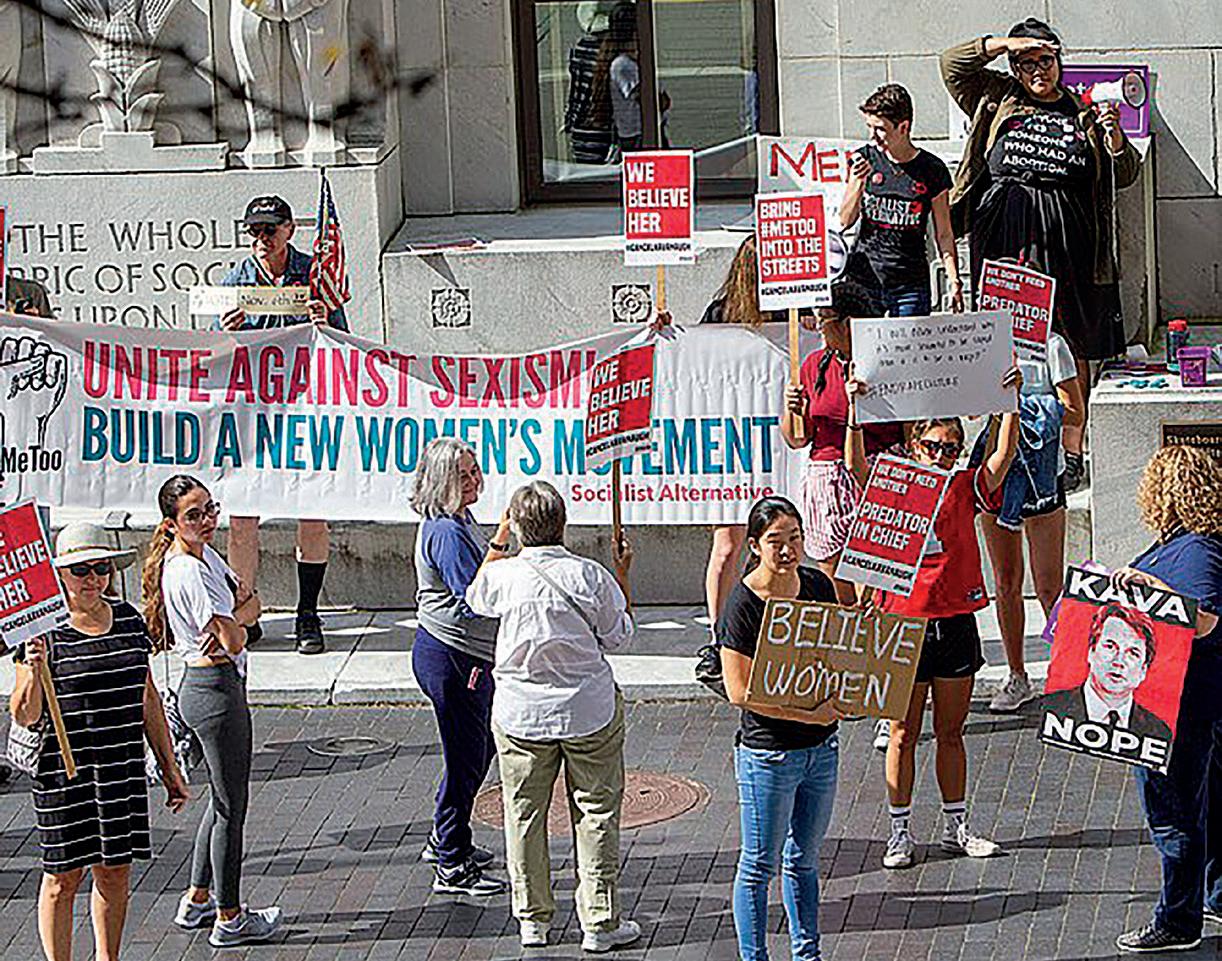
Their negative experiences are minimised into a “he-said, she-said”
In addition to the direct impacts
on survivors, overturning sexual assault charges discourages victims from coming forward. This is extremely problematic, particularly in a context of governments attempting to make sexual assault and rape charges more punishable by law.
The issue of systemic failures that have allowed perpetrators of sexual assault to evade accountability
is historical. It’s a legal issue that lawmakers globally still seek to fully address, with justice for survivors of sexual assault remaining a priority to many government bodies. However, the complexities of the existing laws surrounding sexual assault and the caveats in the prosecution process make it difficult to ensure a completely fair trial .
“Even if I don’t want politics, it’s not for Meta to decide what is political”
THE age-old question of why we use social media remains incredibly subjective and forever changing.
At a time of political turbulence, international crises and rumoured elections, the online world simply cannot remain quiet. Yet the question of where political discussions should occur raises intense debate. In a constant struggle between educational content and clickbait, the

growing relationship between politics and social media is undeniable.

In particular, changes to Instagram mean users have to optin to see political content as part of their suggested feed or reels. Only finding out through word of mouth, I immediately went to change the setting back, finding the change fairly hidden in settings (under suggested content). While I changed it back instinctively, this was largely due to my dislike that the change wasn’t notified to users — leaving the impression that this was simply another method for Meta to filter content. And while this change was first prompted by Meta back in February of this year, the update in March appears to
have had little notice or attention from users. An online poll of 88 Instagram users revealed that only 36 were aware of this update. Following this information, only 12 would then choose to keep the change and limit their politics content. Looking at the matter, one student commented that they think “it’s good not to have political content that confirms our biases constantly,” while others praised the ability of social media to make “politics more accessible to everyone.” One student went as far to question as to whether “Instagram should face anti-democratic legal action” as a result of the update. Further clarifying these changes, Meta has defined political content as “laws, elections or social topics” but not provided more specific information as to what is deemed as “political.” The lack of clarity is concerning as users are left unaware as to what kind of content has been
hidden or what they are choosing to keep. As “political content” is currently grouped beneath options to mute sensitive content, and specific words and phrases, the implication is that the presence of politics on social media can often do more harm than good. While some use this platform to educate and inform yourself, is Instagram really the place to conduct political research?


Is Instagram really the place to conduct political research?
As the way we use social media is incredibly personal, Meta have assured users that the limitation of content is not applicable to accounts they already follow. For me, choosing
politically-orientated accounts allows me to feel a sense of control over this change. If I’m to see political content, it will be one I have chosen to see. On the other hand, many of you may think ignorance is bliss on these apps and may just want to scroll and take a break from life’s stresses. While this is entirely valid, with a general election announced only last week, I urge readers to unblock this setting (even just for the upcoming months) as many campaigns will take advantage of an online presence. Regardless of your preference, make sure to understand what it is you have opted out of, so the choice is yours and not solely that of
to spend
THE end is drawing near: exam season is (finally!) almost over, the wait time for drinks in the Impy garden is creeping back up, and your student loan is slowly but surely dwindling. For me, this is a sure-fire sign to pack my bags and head on out of Exeter for the summer. Here’s why I suggest you do the same.
First and foremost, the summer is the only time I can properly catch up with my family and home friends, without the stress of upcoming deadlines and exams (Christmas and Easter break, I’m looking at you). The sun is out, and there’s no better way to spend a summer’s day than in your local run-down pub garden, gossiping about people you haven’t seen since A-Level results day, with the same friends you’ve had since you were 13. I am extremely lucky to have a family who welcome me with open arms at the end of every term. I find so much peace in returning to my family home and falling back into old routines: morning walks with my mum; cups of tea with my dad; board games with my brother.

I find so much peace in returning to my family home
Summer is a time of rest and relaxation, and I find this most achievable without the constant lure of TP,
with its promise of a deathly hangover and major hangxi ety the following day. As a final year, my decision to head home early after exams has been more difficult than previously. There are many classic ‘Exeter’ rites of passage that I am currently experiencing for the final time, and saying goodbye to my uni friends is so much harder knowing we won’t all be living in the same city as of September. However, those peaceful summer months at home are more needed than ever, as I plan my next steps and look to closing this chapter of my life in Exeter.


AS a student in my final year of university, with the looming horror of graduation and unemployment shadowing all my joy, I would argue that staying at university, post exams and degree completion is the best decision a student can make. Most tenancies in Exeter last until the end of July and come with exorbitant prices. Students pay between £600-£800 per month, and for me, staying till the end of my tenancy is more financially viable. Otherwise, I feel like I am wasting money and watching it pour down the drain.

I feel like I am wasting money and watching it pour down the drain
Peaceful
summer months at home are more needed than ever..
Whilst I will certainly get FOMO from the EGB pics on Instagram, I’m very happy to be heading back home in the coming weeks. After a very stressful few months, I think a few homecooked dinners are well deserved.
Ellie McHale
While bills are expensive, (thanks cost-of-living crisis!) you still have to pay the daily standing charge even if you have escaped home for the warmer months so in terms of finances it’s cheaper for me to remain at university.
As someone who is not from an exciting town, and lives in a small bedroom, staying at uni comes with so many perks. Rather than being stranded in a town with no walkable shopping centres or
Acoffee shops, Exeter in comparison is perfect for spending my summer exploring. From wandering around Devon to taking over the Waterstones Café to spending my afternoons lounging at The Imperial or tanning in Exmouth, there is no shortage of exciting things to do over summer. I am in the lucky position where my part-time job has offered hours over the summer. It means that rather than spending my days twiddling my thumbs and waiting for friends to be free, I’m able to fill my spare time with work. A part-time job in Exeter is a great way to fill the time when the weather is bad, or you’re bored. It’s also the added bonus of having a monthly income to supplement all the quintessential Exeter events like EGB and Exmouth beach trips. Staying at university after exams doesn’t mean you cut your family out. I tend to go back and visit my mum and my grandad every month. Having time to be independent and explore who you are, without the looming shadow of family, is one of the best things you can do in your late teens and twenties to create your own identity before entering the working world.
This fortnight on the internet: dying slang
Eloise Grainger, Sport Editor, discusses new studies suggesting that old slang terms are on their way out
RECENT survey by the research agency Perspectus
Global found that classic British insults are fading out of use. Typical slang words, the likes of which include ‘plonker’, ‘prat’, and ‘pillock’, are dying out with a new generation. The survey found that 25 per cent of respondents were unfamiliar with the term ‘plonker’ — Del Boy would be mortified!

Unfamiliar with ..‘plonker’ Del Boy would be mortified
The study quizzed Gen Z members — those born between 1997 and 2012 — to determine their familiarity with British insults. With the new generation unable to recognise many of the insults
British people have become renowned for, it highlighted the abundance of new slang that has entered the language. Calling someone a ‘Karen’ to denote someone who is entitled and has a habit for complaining is just one example of new language Gen Z uses in their daily conversations. ‘Slay’, ‘simp’ and ‘basic’ are other additions — but this linguistic innovation isn’t anything new. It is a trait of adolescence to generate new words that express situations or feelings. However, the internet and social media world means new
words spread like wildfire. If a new word appears in a viral video, the effects are far reaching, and soon, many young people have adopted it as part of their vocabulary. The study went on to compare tra-
ditional British insults with contemporary ones. Looking to the over-40s demographic, 60 per cent of this group felt that the traditional British insults were more light-hearted and softer back in the day in comparison to today’s controversial substitutes.

72 per cent of all age groups felt insulting your loved ones with slang to be a common British trait. Whilst it may seem mildly offensive to people outside of Britain, it can actually be seen as endearing and as a sign of affection. This is backed up by the survey, as only 20 per cent of people claimed they would take
offence to being called a ‘plonker’.
68 per cent of people felt that Britain’s insults topped any other country’s. British television, with the likes of ‘Only Fools and Horses’ becoming a cultural phenomenon, has spread British slang worldwide. Although some may be saddened by the loss of uptake these words have in modern society, it is to be expected as new generations emerge.

It is to be expected as new generations emerge
Yet it is occurring at a faster rate than ever. Rather than language being distinctive of a culture, it is becoming distinctive of a generation, separating the ‘Only Fools and Horses’ generation from the TikTok generation.
THE first Monday of May is the one day a year that the fashionable set (i.e. me in my pyjamas eating ice cream) gets to judge and ridicule the outfits of elite and entitled celebrities. This year has been no different.
From 11pm BST I was glued to my phone refreshing Getty Images, Twitter, and a blurry Vogue live stream to see the sometimes beautiful, but mainly insane, outfits. This year did not disappoint in its collection of truly horrifying looks There was a wide range of strange and scary outfits ranging from Doja Cat in a towel to many a man wearing the most incredible fits… a plain black tuxedo — the most unique and astounding of all male looks.
This year the comparisons to the ridiculous outfits from The Hunger Games’ Capitol Parade were stronger than ever. Some dresses were carved from wood, others made of thousands of hours of hand-sewn beads, and some outfits weren’t there at all…. I hate to admit that I fell victim for the Katy Perry AI scam. I was even idiotic enough to send the photo to my friend exclaiming about how great she looked.
The theme “Garden of Time” meant that designers flooded the carpet with florals of all kinds. Which, for spring, is “revolutionary” and has never been done before. Alongside the AI photos of Katy Perry outstyling every other celebrity, and the florists that vomited petals onto every guest upon entry, the Met Gala fell flat this year. Even Ariana Grande wanted to fly away: thankfully, she had wings on her face. Hopefully in 2025, when my inner Miranda Priestly rises like Lazarus once again, the A-list celebs will have expanded their fashion horizons to more unique looks.
Maddie Conlan, Arts and Lit Editor

INSTEAD of gazing up at the sky, many students will relate to staring down into a drink. Perhaps an overpriced green Venom? Maybe you tried to gaze up at the lights but after eight drinks the only light you’re seeing is the blue light of an ambulance. Or maybe you were on your way to Exmouth to watch the sunset, cramming onto a three-carriage train rather than waiting an hour for the next one. Maybe you, like me, only realised you missed out on the Northern Lights after flicking through the mountain of Instagram and Snapchat stories the next morning. Maybe you were busy at TP Saturday, attempting to relive terms one and two, or scrolling overheard for a £50 ticket. Or maybe you were sleeping. Honestly, fair enough! Third term’s enough to push anyone over the edge. Well, whatever your excuse was... was it worth it? Emily Alexander

ASATIRE EDITOR:
Rosie Peters-McDonaldS the “non-political” lights dimmed on Malmö the UK shockingly collected its first win since 1997 with “Euromami (Vertigo)” announced as the latest winner of the Eurovision Song Contest. Charli XCX, the ‘Boom Clap’ crooner, sissied that walk on stage with her colourful performance accompanied by Jamaican rapper, Sean Paul. Receiving 12 points from every country — except Cyprus and Greece who mutually awarded each other 12 televote points (and zero jury points), the UK finished with the highest point tally in Eurovision history. With a year filled with Eurovision controversies including (but not limited to) Israel having to alter their song, “Cleanse” to “What War?”; the outright banning of all rainbows; a sponsorship from a specific black and yellow ‘dating’ app; and the inclusion of the Vatican as the newest Eurovision
The UK finished with the highest point tally in Eurovision history

contestant, the hyper-pop songstress’ inclusion in the competition was not the most surprising thing. After a dire last few years at the Song Contest (ignoring the space person song anomaly), the BBC conducted a survey (read as “executive board meeting”). The suits put their heads together and asked themselves what the people would want
from a UK Eurovision entry. They asked… “Who is gay or, like, gayadjacent?” — Charli XCX (She’s not actually, but she’s a ‘mother’ so close enough ). She’s big in Germany (or that one song was), no? Despite it seemingly being an ill-fated attempt to flex star power to solicit votes, she did it. No one thought we could do it (we didn’t either). Graham cer-

I believe I know the culture. Jaja ding dong! I’m ready for Eurovision!
tainly didn’t during his voiceover. A few days ago, when asked about her thoughts, Miss XCX said: “I know my odds for winning are at one per cent, but I’ve scanned the texts and I believe I know the culture. Jaja ding dong! I’m ready for Eurovision!” Ready she was as the cameras opened unto an upside-down Charli in a rotating car surrounded by sweaty dancers. Clad in an allleather black outfit adorned with a large multicolour faux coat, the singer gyrated on the almost blindingly lit stage to an upbeat techno track before belting out in Gaelic at a seemingly random moment in the second half of the song. As Miss XCX delivered her dance break to a chanting crowd, no one other than a jorts-wearing Sean Paul walked onto the stage to eventually end the song with “I don’t care who you are. I don’t care where you come from. All we got is this moment, so let’s come together” in a thick Jamaican accent of course. See you all next year in Brighton in 2025.
ROUND up, round up! The greatest show on earth has come around once again after a four-and-a-half-year reprieve. The circus which is the Great British General Election has come into town and the usual troupe of clowns are making their appearances up and down the country. There is one unfortunate, heart-breaking absence from the usual lineup. Perennial loser and populist man of the people Nigel Farage has bravely run away from losing for the ninth time at a general election and instead defected to the grander, tawdrier Trump circus. Carrying on with this searing loss, the current lion tamer of the Conservative Party — Rishi Sunak — has sauntered out across the country (after finding somewhere

to dry his suit) to show off his famous personal touch and general… humanity… However, he has made complaints about his new personal soundtrack — D:Ream’s ‘Things Can Only Get Better’. Alongside him is not a typical clown (er, politician). Sir Keir Starmer — most famously the son of a toolmaker — is hoping to create a calmer circus without any of the issues of the past 14 years, such as any near bankruptcies of the circus or leaving the European Clowning Union (ECU). No matter who comes out on top in the latest tour, the one certainty over the next month is non-stop laughter, slapstick and fun for all the family.
Charlie Gershinson, Deputy EditorAFTER calling an unexpected general election last week, Rishi Sunak has made a campaign stop in Exeter, to the delight of the Tory Society and literally no one else.
The prime minister (for now) began by touring the University’s Streatham Campus, where he praised Britain’s university sector for contributing £130 billion to the economy — just before he announced £131 billion of cuts to higher education as part of the Tory manifesto.

He then continued into the city centre, where Sunak greeted local residents on Sid -
well Street. The visit was tarnished, however, when the Tory leader was overheard telling an aide, “get these smelly workingclass proles away from me, I could be on a beach in f***ing California instead right now.” Finally, Sunak made a surprise visit to Timepiece, where he was filmed downing a Venom. Since the clip went viral, the prime minister’s approval rating has now soared, laying down the gauntlet to Labour leader Keir Starmer to do the same.


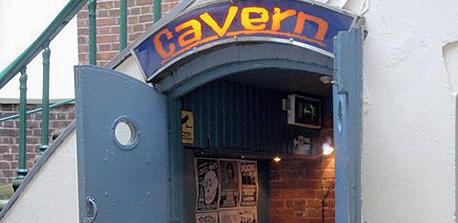




ACITY break was the breath of fresh air I needed amidst writing my dissertation over Easter. New York, a destination long-awaited on my bucket list, finally got its checkmark. April turned out to be the ideal month for this visit, with clear blue skies and just a few brief showers! I explored the city over a five-day trip. This time frame allowed me to see all the major sites without feeling rushed. Planning is key when making the most of a short-stay trip. I made a list of all the attractions and activi -

ties I wanted to experience, then integrated them into my schedule as the trip progressed. This approach provided flexibility to accommodate the weather, which was especially important for climbing skyscrapers! Booking in advance is essential, but it can be managed with just a few days’ notice. I learned this the hard way when I tried to visit the Rockefeller Center without prior booking. Fortunately, I opted for the Vanderbilt One building instead, which turned out to be a highlight of the trip! This visit offered an interactive experience with much more to explore beyond the skyline (though the view alone was worth it). New York truly comes alive at night, living up to its reputation as the city that never sleeps! On days when the weather was less cooperative, I focused on museums and galleries. The 9/11 Memorial Museum was the most moving exhibit I’ve ever visited, and I spent about three hours there. If I had to choose just one top recommendation, it would be this museum. To save money and see multiple attractions, I found bundled tickets through reliable distributors like the app Get Your Guide. New York is one of the most expensive places I have ever visited, but there’s so much

EXMOUTH: an integral part of the Exeter University community. It is a beach where likely every student (and, let’s be honest, probably every lecturer) has made core memories along its sands that reflect a golden hue in their kaleidoscope of university recollections. Whether it has been the location for marking the first swim of the new year or hosting beach birthday celebrations with picnics and sunshine, Exmouth offers both physical and spiritual freedom for students; it is a place to feel disconnected and connected simultaneously. Only a short, scenic train ride away from the hub of Exeter, we can glide away from the stresses and structure of our student lives and escape to the slowness that Exmouth radiates. Watching the locals stroll along the water’s edge with their sparklyeyed dogs, being able to explore a new centre of shops and cafés, it is a beach that enables students to feel present and immersed in a calmer, refreshing environment. I have made many treasured visits along Exmouth’s beach that I will look back on with so much gratitude — eating chocolate strawberries whilst admiring the glowing sunset stretching across the ocean; enjoying friendship painting dates sat against the sea wall with sand-gritted brushes; collecting shells in my first year that now rest along the windowsill of my final year room. As I prepare to graduate and shed the skin of my “Exeter student” identity, there is an emotional
to see just by walking around. I definitely got my steps in exploring Central Park and going for a morning run across the Brooklyn Bridge! The High Line offers a peaceful escape from the bustling streets, and Chelsea Market has some delicious food options. While Greenwich Village is also great for restaurants, SoHo has some unique pop-up shops and contemporary art galleries! New York has often been named the multicultural capital of the world and its diverse cuisine and history is really what makes it stand out.
along with breaking out of our typical daily routines can be just as energising! If you’re worried about falling off your routine, keep those more basic habits intact; this makes adjusting back to work much more streamlined.
THE 9/11 MEMORIAL MUSEUM WAS THE MOST MOVING EXHIBIT I HAVE EVER VISITED
To make the most of my stay, I made sure to get up early. This allowed me to visit the sites during the quieter morning hours, making the experience much less overwhelming. It also made dealing with jet lag easier when I returned home. We often assume a chilled day on the couch is what will recharge us during times of stress, but sometimes the opposite is true. There are lots of different types of rest and doing something new
The battle of the beaches

Lifestyle writers tackle the all important question: which Devon beach is the best?
connection to places like Exmouth that I never truly recognised until now, when the dawning realisation comes that this beach is not going to be a regular part of my life forever. Take every opportunity you can to make memories on Exmouth’s euphoric sands, to unwind in nature after a congested day in the library and have fun with friends throughout the seasons — even if it means a windswept walk in November, you will still probably look back on it with joy. That is the beauty of this beach: it is a place where you must absorb every moment on it (especially during these British summers when the weather decides to ration its sunshine days). You will look back one day and realise the warmth it holds within your times at university. Lucy Rawlings, Lifestyle Editor

DAWLISH Warren beach takes the top spot for good reason: which other beach houses an Elephant Rock and an amusement park? Not that I’ve ever interacted with either of those features, but they certainly add character to what is, in my opinion, our best option for a sunny day trip not too far from campus. With a beautiful view of the Jurassic Coast and several great food and drink options, there isn’t much to improve upon.

Dawlish Warren has a simple seaside charm unlike that of our other local outing options: Teignmouth lacks its breadth and feels like more of a town, and Exmouth feels less dynamic and is often far busier. Having tested the milkshakes from Dawlish Warren’s central refreshment shack as you walk towards the beach area, I can also attest to their quality. Exmouth’s ‘thick shakes’, however, which you can find about halfway down the beach, are a little too rich for my liking. And while I certainly wouldn’t turn my nose up at a cheap and cheerful portion of real chip shop chips at Exmouth, Dawlish has no lack of those, either, and boasts a more scenic view — fewer people, more jagged rock in the distance — to sit and observe at lunch time. The sectioning off of the beaches at Dawlish
Warren makes it easy to find your friends (and to separate yourself from the hoards of screaming children on super busy days). What really boosts its charm for me, though, is its proximity to Dawlish itself, and the beautiful walk along the sea wall you can do from the town to Dawlish Warren. Getting on the train to Dawlish on a warm day, picking up some lunch and walking along the sea wall towards Dawlish Warren is the perfect summer outing, so long as you remember to pass by Dawlish’s famous black swans on your way! And if it’s raining by the time you dock at Dawlish Warren, take a trip to the arcade to watch a basketball-obsessed friend spend his spare change on the Allstars machine (this is only slightly autobiographical). Rosie Peters-McDonald, Satire Editor
 Image: Amberly Wright
Image: PublicDomain Pictures.net
Image: PublicDomain Pictures.net
Image: Amberly Wright
A BEAUTIFUL VIEW OF THE JURASSIC COAST
Image: Amberly Wright
Image: PublicDomain Pictures.net
Image: PublicDomain Pictures.net
Image: Amberly Wright
A BEAUTIFUL VIEW OF THE JURASSIC COAST
THE end of university is fast approaching for finalyear students; the dreaded dissertation deadline has passed, graduation preparations are in full swing and it is a time of reflection for many. This final third term is a bittersweet time for graduates in many ways, signalling a period of closure and transition for those moving onto their next chapter. Whilst I would not consider myself a particularly nostalgic person, it is nice to look back on the last three years and some of the highlights of my university experience. One particular memory I hold close to my heart is my housemate’s 20th birthday last May. Despite waking up with a hangover from our antics at an embarrassingly empty Timepiece the night before, we had a very wholesome morning of gift-giving and debriefing before venturing to Exmouth. A beach day is always my idea of a perfect afternoon — we feasted on a barbeque of some slightly sandy burgers, listened to a blend of Paolo Nutini and Mac DeMarco, and screeched as we entered the ice-cold water. Although a couple of my housemates ended up catching up on some sleep whilst they sunbathed, the sun miraculously cured my hangover (this may have something to do with the lukewarm bottle of prosecco I also consumed). Whilst the day wasn’t anything particularly eventful, it was filled with gorgeous weather and a lot of laughter, and is most definitely a memory from university that I will always treasure.
Maya Fernandes, Online Music Editor
IT'S safe to say that I have made the most of my three years at Exeter. Starting university in 2021, after over a year of lockdown and isolation, I was ready and raring to go. I’ve had phenomenal experiences through societies, travelled the south-west and beyond, and thoroughly enjoyed my course. There are stand-out memories, of course. Nights out that lasted longer than necessary, formal events with far too much table wine, sunny open days spent directing cars into parking spaces. However, it’s the memories I often forget, that get jogged by a funny comment or a random object, which mean the most to me. The first time I met my housemate in Blackwell’s when we both reached for the same textbook. My first breakfast radio show that was delayed for 40 minutes due to my technical incompetence. Day trips to Bristol, visits to Dawlish Warren, and far too many pints of cider at the Impy after my last in-person exam. Listening to noughties music in the kitchen, fighting over video games, losing intramural netball matches. Befriending lecturers, hiding from exes on campus, and attending Cheesy Tuesdays for far longer than was socially acceptable. I’ve embarrassed myself in lectures, derailed study days, and pulled failed all-nighters. There isn’t just one fond memory I can conjure and regale. My three years have been jam-packed and varied in a way I could never have imagined. It’s the little things about Exeter and university life that I’m going to miss the most.
Florence NewLivvy Mason-Myhill, Editor-in-Chief, shares her excitement for her post-dissertation plans

FOR many students, now is the time that they are free from the shackles of uni work and exam stress and, now they finally have the chance to enjoy the summer weather alongside potentially having time to relax. For myself personally, I am so pleased that I have finished my degree, after writing an 8000-word English dissertation as well as a 4000-word essay that completely drained me. But at least now I am free. It's understandable that a lot of final-year students are probably quite stressed now that they have finished their degrees as they are most likely con -
templating what they are now going to do for the rest of their lives as they struggle to navigate the intimidating job search. Whilst that might be a slightly terrifying (or exciting) thing to think about, it’s also a time for students to enjoy the mostly warm and sunny weather here in Exeter and to just have fun.

A LOT OF FINAL YEAR STUDENTS ARE PROBABLY QUITE STRESSED NOW
The most obvious way to celebrate the end of exam/deadline season is to go out clubbing. Most people would probably opt for a sparkling night on the Timepiece dance floor, whether that be for a Wednesday sport night, a TP Friday or even one of their events such as the silent disco or the Indie Thursday they have recently introduced. For those who see themselves as more edgy, definitely opt for a night out in Cavern. Or you could have your own night out by going out for drinks or going to the pub for a pub quiz and karaoke. Another great option is a classic summer party that you can host in your garden, accompanied by picky bits, cocktails or even a barbecue. If you aren’t too keen on boozy nights out, then I would recommend having a wholesome night in with friends and housemates. Stick on a good film, have an array of snacks and give yourself some time to relax. You could also do something like a pizza night or a home spa night to switch things up a bit. Overall, this is your perfect opportunity to spend your summer in Exeter however you want! Just ensure that you are having fun and celebrating all your academic acheivements .
OVER the last three years, it has been extremely hard to pick one favourite memory of my time at the University. However, one constantly stands out. In first year, we had an unseasonably hot March, and towards the end of the month, two of my friends and I ventured to Dawlish for the very first time. It was the beginning to many beach trips. I adored the little seaside town, and the beach was relatively quiet (unsurprisingly given the time of year). Through all the screams and giggles of getting into the freezing sea, while locals watched from the wall, I was reminded of a child-like glee of going to the beach. All the stresses of end-of-term essays and the looming exams of the following term disappeared for this one day, and I felt a pure happiness. It was like we were young teenagers again: giddy and free. After the cold swim, we went to a nearby fish and chip shop, of which I got my usual cheesy chips, and sat with intent to read our books like the typical English students that we are (very little reading was achieved). Since then, I have continued to return to Dawlish, which have become core memories of my university experience. From more reading dates with my closest friends, to walking my dog with my mum, to a mini-golf and arcade date with my boyfriend, these happiest moments stem from my first trip to the beautiful seaside town.
Benedict Thompson, Features Editor, enlightens us on the mental health benefits of playing squash
COLD and commercialised is out. Cosy and independent is in. A visit to Devon and Exeter Squash Club, hidden amid Exeter’s campus, is one of its kind. Home to a local community of squash players, the club was established by Adam Lings, a local in Exeter. After researching a nearby place to have a break from work, the club seemed the perfect option. The location, adjacent to the Streatham Campus, is brilliant and is barely out of the way for many students. I arrive for an hour match on a Monday night, keen to experience what the club has to offer. As you walk up to the entrance, the first thing that strikes you is the atmosphere inside. You can even hear the chants outside. The club’s bar, which is surrounded by the courts, makes for an exciting atmosphere. On some days, it is filled with both students and locals. As well as squash courts, there are weekly tournaments. It is both social and competitive. We get speaking to the members. One member tells us he has been coming for years and that the club has been the perfect social outlet for him. What attracted him was the friendly atmosphere. Others also said it is the local community feeling to the club which makes it special.


From discounted student memberships to a discounted bar, the club has managed to put both locals and students at the centre. Exeter offers many options for social gatherings. But having that combination of both local and student life is a rare combination.
Lauren Walsh, Arts and Lit Editor, talks about the theatre highlights of the year
IT’S hard to believe it’s already the end of May, marking the end of the academic year with all its stresses of deadlines and exams, and almost the halfway point of 2024. With that in mind, let’s have a look back at the theatrical highlights of the year so far. A stand-out for me personally is Hadestown , a musical based on the Greek myths of Orpheus and Eurydice, and Hades and Persephone. Starring Dónal Finn as Orpheus and Grace Hodgett Young as Eurydice, the show opened in February following great success on Broadway in the US. It features beautiful music and lyricism and is a heartwarming tale about the importance of hope in the face of despair.
Another show I am itching to see is Spirited Away , a stage adaptation of the Studio Ghibli film of the same name. This follows the success of The Royal Shakespeare Company’s version of another fan-favourite Ghibli film, My Neighbour Totoro , which opened in 2022 and ran a limited season at the Barbican earlier this year. Spirited Awa y is performed in Japanese with English subtitles, as the company came from a run in Tokyo, and uses impressive puppets to transfer many of the fantastical creatures from the film to the stage.
Other well-known plays this year have included Arthur Miller’s A View from the Bridge starring Dominic West, and Henrik Ibsen’s An Enemy of the People starring Matt Smith. Smith is also not the only Doctor Who actor to play the lead in a West End play this year, with David Tennant playing Macbeth in the Scottish Play. There have also been some new musicals that have played on the West End this year, including The Little Big Things and Next to Normal.
The 2024 Olivier awards (which, for those who aren’t in the know, are awarded for excellence in theatre in London) took place in April, rewarding the previous years’ worth of theatre. The main takeaways were Dear England winning Best New Play and Operation Mincemeat winning Best New Musical. Best Musical Revival went to Sunset Boulevard, which won a whopping seven awards of the 11 it was nominated for. Andrew Scott’s one-man play Vanya — based on Chekhov’s Uncle Vanya — won Best Revival, and Sarah Snook, perhaps best known for her role in TV show Succession , won Best Actress for her part in The Picture of Dorian Gray. However, theatre is not only available in London.


ETHE REMAINING MONTHS OF 2024 PROMISES A LOT OF GOOD SHOWS FOR THEATRE FANS
Many acclaimed shows have toured or are currently touring the country this year, including musical theatre cult classics such as Hamilton, Heathers and Come From Away. Others include West End staples like Agatha Christie’s The Mousetrap , which celebrated its 70th anniversary with a national tour, which even visited our very own Northcott Theatre here in Exeter! The musical Dear Evan Hansen is also set to start touring in September. The remaining months of 2024 promises a lot of good shows for theatre fans. For example, Mean Girls will open on the West End in June, following its film adaptation’s release in January of this year (how fetch) and the musical of Meryl Streep and Anne Hathaway’s early 2000s hit The Devil Wears Prada, with music by Elton John, will open in October. Shakespeare’s Globe is also putting on many of the Bard’s famous plays over the summer, including Richard III, Much Ado About Nothing , and Anthony and Cleopatra. So, whether you prefer a cheesy musical, a serious play, or just want to see if the stage version of your favourite film is any good, there is sure to be something that fits your taste playing in a theatre somewhere this year.
VERYBODY is familiar with T he Great Wave off Kanagawa, The Fighting Temeraire or The Sea at Les SaintesMaries-de-la-Mer . All incorporate either quaint sceneries of boats bobbing along the shore, or vast oceans with towering waves. But what I’m interested in is how human life is incorporated into artwork of the ocean.

who are unassisted in their journey, which can take up to three months to complete. It is truly a test of the relationship between man and sea.
WHAT I’M INTERESTED IN IS HOW HUMAN LIFE IS INCORPORATED INTO ARTWORK OF THE
Alfonso Anderyz — a local painter in San Sebastian de La Gomera in the Canary Islands — uses watercolours to give his interpretation of the ocean. The location at which he resides is also where the Talisker Whisky Atlantic Challenge has its start point — a gruelling 3000-mile ocean rowing race across the Atlantic, with the finish line on the lush beaches of Antigua in the Caribbean. The race challenges both the rower’s physical and mental strength, particularly the solo rowers
The painting encapsulates this idea perfectly, picturing the rower as just a small part of the wider picture. The darker blue tones highlight the depths of the ocean, the vastness it has, and the unknown it holds. The glistening lighter tones of the flying fish add a shimmer to the painting, making the sea creatures look almost magical when they are very much real. Even the oars of the boat mimic the wings of the fish. To me, the painting acts as a reminder that humans are part of nature, not apart from it — and I think that is quite a profound statement the artist incorporates.

THE DARKER BLUE TONES HIGHLIGHT THE DEPTHS OF THE OCEAN
Sports provide a fantastic platform for people to express their interest in issues or ideas outside of the sporting world.
For solo ocean rower, Daryl Farmer, ocean
conservation and wildlife rescue were significant for him to address. His team raised £15,000 for the East Sussex Wildlife Rescue Ambulance Service, a charity that cares for wildlife which have been injured, particularly by road accidents. Anderyz admired Farmer’s solo journey, which took an astounding 96 days to complete, and especially enjoyed the story of flying fish launching themselves onto the boat deck.
Anderyz gifted Farmer the painting to remember both the adventure and the significance of the ocean.
As summer is just around the corner, I think it is important to recognise the beauty and power our oceans hold, and respect it for what it provides in terms of health and wellbeing. Many of us frequent the beach during this time, so reflecting on how we fit into nature holds great importance, particularly in the state of our current climate. Our oceans support us, so we need to support our oceans.

IN the last few years, the landscape of literature has shifted vastly. What is popular and trendy one year can fall into obsoletion in the next. Sometimes the trends come and go so fast it’s difficult to keep up with them. The aim of this article is to summarise some of the key trends and moments in the literary world over the first half of 2024.

WHILE THESE TWO NICHE SUBGENRES HAVE BEEN THRIVING SUBTLY , 2024 HAS SEEN AN INCREASE IN MAINSTREAM POPULARITY
To me, and my echo chamber of fantasy and fiction novels, two new genres have emerged — or found new and extreme levels of success — and these have been Fantasy Romance, known as Romantasy, and Greek Myth retellings. While these two niche subgenres have been thriving subtly for the last few years, 2024 has seen an increase in mainstream popularity. Many Romantasy authors are being picked up from the indie sphere by traditional publishers and a new retelling is released every month. This increase in women’s stories, and romances, has proved a huge success in the publishing market. It seems like 2024 is the year that romance is finally being seen as a viable and marketable genre.
A ‘reading wrap-up’ cannot be complete without mentioning one of the biggest influences in publishing, BookTok. Though TikTok has many spheres, BookTok is a leading influence in what book stores are stocking. These include more romance books and more books that are targeted at women. Hence the many BookTok tables in stores such as Waterstones and WHSmith. Though I am not enamoured with the monopoly that BookTok has within the industry, its influence is only growing and has been monumental in spotlighting diverse authors and stories.

The influence of a media platform in what publishers are acquiring and what book stores are stocking, hasn’t happened overnight. This invasion of influencers — who now hold the power to make or break the success of a novel — has been building for the last few years and has arguably hit its peak in the first half of 2024. This ties in with some prominent indie authors, such as
Sarah A. Parker, making the shift from selfpublishing to traditional publishing. The Big Five publishing houses have become aware of the sheer influence that a viral BookTok book has, and how much consumers will pay to get their hands on the next hot novel, so they have jumped onto embracing the marketing that BookTok influencers can bring them.
In the mid2000s/2010s, there seemed always to be a book everyone was reading. Fifty Shades of Grey by E.L. James sold out shelves in book stores, everyone was at one point talking about Twilight, and every woman alive had picked up Michelle Obama’s biography or decided to buy a Colleen Hoover book.
To my knowledge, we have not yet found a book that will transcend reader spaces, such as BookTok and Bookstagram, and reach all aspects of a mainstream audience. I believe that this is due to the over-consumerism that social media perpetrates. Everyone is buying books that only have a short shelf life. A first-half 2024 wrap-up would not be
complete without mentioning Spotify’s bold expansion into audiobooks. Thankfully the ableist, elitist ideal that audiobooks were not classed as ‘real reading’ has been shamed out of the general public and allowed for more people to embrace the joy of reading audiobooks. They’re amazing for the car, for walks and long hours at work. 2024 has marked the brave move of Spotify going up against audiobook juggernaut Audible. Spotify now gives subscribers 15 hours worth of free audiobooks a month and they already have a wide catalogue of books, ranging from modern classics to Austen, for readers to choose from. Though you do have to pay to unlock the whole book if you max out those allotted hours, it’s a start to taking down the notion that Audible is the only platform that can find success in the world of audiobooks.

EXCITING TO SEE HOW LITERATURE EVOLVES
It will be exciting to see how the world of literature evolves in the next six months. Will vampire romances begin to make a comeback? Will we have a paranormal romance make a mainstream comeback? Will any of the books that have been bought for adaptation make it onto our screens? And who will be the author of the next mega model? Only time will tell…
Arts and Lit writers recommend their all time favourite books
George Orwell’s 1984 is a timeless example of cautionary, dystopian fiction which demonstrates chilling parallels to even today’s global politics. Written in 1948 as a warning to governments, global corporations, and citizens of the world, it deals with the consequences of fighting against repression. The reason I love this novel so much is because the events that unfold within are coming to fruition before our very eyes — even UK politics are a microcosm of the totalitarianism and social segregation we read of in the novel. The protagonist, Winston Smith, serves as a reminder that, as functional members of society, we are still no more than cogs in a machine and that Big Brother is always watching.
Gracie Moore, Online Arts and Lit Editor
The Outsider by Albert Camus
This book changed my outlook on life. Despite being a translated work, the words retain an elegance that feels completely natural and unmanufactured. Camus delivers nihilism, mundanity, and tragedy so powerfully, punctuating them with moments of utter beauty to create the most emotional, overwhelming prose that I’ve ever encountered. Also known as The Stranger, the book begins with Meursault experiencing his mother’s funeral in the French Algerian heat and extends into him grappling with existentialism (which Camus himself philosophised over). The Outsider truly encapsulates the experience of being alive. Megan Hall
Eve Babitz’s Black Swans is a collection of nine short stories reflecting upon the author’s experiences of Los Angeles in the 1980s and early 1990s. The collection captures the essence of LA, navigating the city’s inner circles and shedding light on both its allure and its challenges. From encounters with famous celebrities to intimate reflections on personal experiences, each essay offers a glimpse into Babitz’s world of romance, rage and the secrets of the Château Marmont. Black Swans is candid and engaging, making it one of my go-to recommendations, and the perfect choice for anyone searching for a short read this summer. Maya Fernandes, Online Music Editor
Just Kids, Patti Smith’s acclaimed memoir, follows the journey of her life and friendship with photographer Robert Mapplethorpe, through the gritty bohemian scene of New York in the 1960s and 70s. They lived a life dedicated to art, and this book tells her nostalgic story of their growth to fame. Patti’s narrative completely epitomises this era of rockand-roll, poetry, and art, with anecdotes of other famous artists such as Jimi Hendrix, Janice Joplin and Andy Warhol. Although I knew little of Patti Smith beforehand, and am not an avid memoir reader, this transportation into her mind and life with Robert Mapplethorpe, was completely enchanting, as an ode to New York City, love, and music. Anna Spencer
Malibu Rising by Taylor Jenkins Reid
To get out of dangerous missions, you have to prove you’re insane. But wanting to get out of the missions proves you’re sane. Thus is Captain John Yossarian kept on a US airbase on a Mediterranean island in World War II. All he and his companions want to do is survive, and their greatest enemy isn’t the Germans, but their own superiors and the surreal traps they set. With its winding prose, its flitting between viewpoint characters, and its jumping back and forth in time, Catch-22 is a kaleidoscope of absurdity and a book unlike any other I’ve read. Oliver Lamb, News Editor
A story of the heart-breaking pain of love and loss, Taylor Jenkins-Reid’s Malibu Rising has been an all-time favourite of mine since its release in 2021. As it moves between time of a mother and daughter spanning the 1950s-80s in Malibu, California, Reid tells a story of two women who are forced to grow up too soon and endure more than anyone bargained for. Yet, even when the Riva family are in flames, they rise from the ashes; for them, family is more than the blood they share. It is the summer book I will never fail to reread. Phoebe Ozanne
Scarlett Cracknell, Music Editor, talks to Peter Jolyon about his upcoming mainstage apperance at Hijacked
WITH beer gardens and beaches being filled, all we want to hear is a bit of garage on a hot day with a drink in hand. And on the 30th May, that's what most Exeter students will be doing. Instead of piling into The Imperial or onto Exmouth beach, students will be flocking to Double Locks for Hijacked festival where Business Economics student, DJ, and producer Peter Jolyon will be performing mainstage alongside Sammy Virji, LF System and Mall Grab. Exeposé has recently has the opprotunity to talk to Peter about his music career and his hopes for Hijacked.
É: We're really glad we could get a chance to grab you before Hijacked! We initially wanted to ask about how your music career began?
PJ: Thank you for having me! I guess it started in primary school when I was seven or eight and I learnt the saxophone, and I’ve carried that on since. But I started properly making electronic music in around 2017 or 18. I used Garageband on my mum's laptop and just messed around — it was a classic starting point. Then I got really interested in it, so I saved up a bit of money and bought my own equipment. It started out quite bad, just trial and error really, but I started to get better from watching YouTube videos and paying attention to other artists' methods.
É: When you say you learnt by listening to others, who have been your three biggest artist inspirations and why?
PJ: I would say Disclosure at the minute, they’re quite big. The sort of garage side of things is solid, and I really like their use of classic synths from the 80s. I also think Fred Again is pretty
good at the minute. It’s a basic answer, but the way he incorporates day-to-day life in his music is really cool. And I’ll chuck in some classic rock bands in there like Queen. I’m not only into electronic music; I like all styles of music really.
É: Have you seen Disclosure or FredAgain... live?
PJ: I saw Disclosure live at Boardmasters in 2022, it was crazy. My friend’s birthday was that weekend, and it was the highlight of my weekend.
É: Yeah I went in 2022 as well he was amazing live. How do you feel about the live music scene in Exe ter? You’ve done quite a bit with Snowsports and now with Hijacked. PJ: There’s definitely opportunities to DJ which I’ve been lucky to get involved in. Like you say I’m playing at Hijacked and the people organising it are great at supporting garage music and a bit more underground sounds. Playing at TP (Timepiece) is good as well because you’ve got classic club songs you can chuck in there. I also went on the Snowsports trip [he was wearing the t-shirt] and so I helped in France which was really good fun.
É: How do you work around your busy student life and music career? You’ve had a lot going on not just with festivals but also with BBC Introducing and other great things.
PJ: I think you’ve just got to be quite disciplined. It’s easy to get carried away trying to make music and do DJ stuff. Oftentimes I use music as a reward after doing work, and I probably make much better music once my work is out of the way and my head’s clear. I prioritise my course a bit more at the minute with exams, but after I can have a bit more fun with it.

É: Yeah once you’re home you can have more fun I think. How do you work around playing here and then your home address?
PJ: There’s not much going on back home in Poole. It’s more just friend’s house parties, so most of my opportunities come from Exeter.
É: Do you prefer the smaller crowd house party vibe or a bigger crowd?
PJ: It’s a tricky question. A bigger crowd is cool, but a smaller one is more intimate. When I was in France for the ski tip, it was a small club and everyone was compact and by the decks com-
Apared to being a bit further away when it’s bigger. É: I think you may be the first to say they like people being near their equipment!
PJ: I obviously don’t like anything being touched, but I think its more fun everyone being closer and more intimate. I like boilerrooms where it’s compact but everyone’s really having fun together.
É: Are you excited for the large crowd you’ll have at Hijacked?
PJ: Yeah definitely. Performing on the main stage will be pretty cool. I’m also really excited to see Sammy Virji, I’ve met him briefly before when he was in Fever last year. I don’t remember much of the night, but it was cool. I'm also excited to see LF System and Casso.
É: I know you’re moving to London next year on placement, do you plan to continue doing music in London?
PJ: I'd like to say I could. I’ll definitely try because there are so many cool opportunities in London, but I’ll have my big boy job to prioritise. At the end of the day, I have to look after myself. I’m looking forward to coming back to Exeter in fourth year though.
É: I’m sure you will find opportunities in London, but I agree you should put your 9 to 5 first for now! If you didn’t have a 9 to 5 though, what would be your dream live performance? PJ: I would say some sort of gig on the beach. Everyone on the beach is always in good spirits and wants to have a good time. It’d be cool to do Boardmasters because I’ve already been and I can imagine myself there maybe at some point! But for now, I’ve got Hijacked and then my big boy job to worry about.
Scarlett Cracknell, Music Editor, speaks with student artists about their experiences of Exeter's live music scene
Aiden MalikIDEN Malik is an artist who is heavily inspired by the likes of Passenger and Jamie Lawson. He studies Business Economics at the University, teaches at Exeter College, and uses his free time to enjoy performing live around Exeter. Scarlett Cracknell, Music Editor, asks him about his experiences that led him to the interview.
É: How did you start your music career?
AM: My Dad is still a singer by trade, so there’s always been music in the household. I picked up my first instrument at four, started writing songs at 11 and then started busking at 14. I did it weekly for three years, and I do it every so often now that I’m busier. The good thing about busking is you get to network, and then suddenly you’re playing in Bath, London and Edinburgh!

É: Busking does seem like good fun with a more communal crowd! When did you start to record?
AM: Covid hit and all I could do was sit in my room and write songs. I squeezed an album out called Songs of the Pandemic and I’m really proud of it knowing that it’s terrible by industry
standards. I didn’t pay a penny for it; anyone who worked with me did it out of the kindness of their hearts. The nature of the pandemic is that we were relatively restricted in what we could do, and so it is an album that makes the best of what it has. Some of the songs are better than others, but I love them all.
É: I also wanted to ask you how you juggle your music with student life?
AM: I’ve been able to keep it up. I was very lucky to be president of Campus Bands back in my second year; it was great because now I have a great list of venues who are supportive of students. I also did a placement year in London and Bristol. I was able to do loads of collaborative stuff in London, then in Bristol I had my own fortnightly open mic night which was a great mix of comedians and musicians which was lovely!
É: Have you got any upcoming events in the summer for our readers to hear about?
AM: I'm slowly jumping into recording Album two and on the 17th August I have the Wedmore Harvest Home Festival in Somerset where I’m performing with my dad! I also have a stand-up show at Edinburgh Fringe this year called ‘Grad Habits’ from the 3rd-10th which is going to be great. I’ll try and perform some last-minute gigs whilst there, which will be nice! It’s about spontaneously enjoying music for me rather than wanting employment.
ATT Smith studies Anthropology at the University, and feels the influence of his course on his music. He spoke with Exeposé about his experiences in Exeter as a musician. É: When did you start your music career and what inspired you to start?
MS: I could say I started when I was 12 because that’s when I started getting passionate about music, but I didn’t play any gigs till I was 16. So that’s when it truly began in my hometown Tunbridge Wells where I played Tunbridge Wells Forum. It’s a great venue for championing young artists.
É: Who are your biggest inspirations when performing and recording?
MS: There are so many, but the first band that really got me into music was The Clash. If it weren’t for them, I’d have never picked up a guitar in the first place. For a long time, I hated The Beatles, but I had a revelation and now I’m a complete convert. I really love it when bands successfully marry pop and avant-garde together; in albums like Revolver and Rubber Soul, it’s done perfectly. I love when experimentalism marries minimalism.
É: How has it been juggling studies and recording/performing?
MS: Somehow my course has managed to have an influence on my writing. I’ve written a song about an extract from the Rig Veda and about Tom Wolf’s
The Electric Kool-Aid Acid Test. But otherwise, it can be very difficult because of rehearsals. That’s why I’m very passionate that bands should be more vocal about getting paid. When I was younger, I had so much excitement and didn’t prioritise money at all. Now, I’ve played enough gigs to realise it’s not just playtime; there’s labour that goes into this.
É: How do you feel about the live music scene in Exeter?
MS: I feel very supported, especially by Campus Bands. I play a lot at the Old Firehouse on Sundays. I also love campus band jam nights at The Stoke Arms and a jam night at Angel Bar run by two students, Daisy and Burt. The Angel Bar jam night gives more room to really freak out and be experimental which I love. É: Do you have any upcoming gigs that you would like to tell readers about?
MS: I’m planning a gig at the Angel Bar at the end of May. Otherwise, I’ll be at The Old Firehouse soon. If people are in terested in seeing me, they can follow my In stagram @mattsmith cosmicexperience.

Jake Avery, Music Editor, interviews the co-owner of Cavern to explore its importance in the grassroots music scene

CAVERN serves as a hub for music culture, cultivating artists from both the local area and beyond. Over the years it has become an integral part of student nightlife in Exeter. With other venues across the country closing down due to financial challenges, Jake Avery, Music Editor, spoke to the venue's co-owner David Goodchild to discuss the significance of grassroots music in Exeter, along with the legacy of Cavern.
É: Cavern has helped the grassroots music scene thrive in Exeter for 33 years, fostering iconic bands such as Muse, Coldplay, Napalm Death, The Cranberries and more. How does it feel having played an important, and in many cases critical, role in supporting the trajectories of bands?
David Goodchild: Playing in bands and putting on bands has always been something I loved, so it feels right to be part of the Cavern. I’ve been here almost 35 years now so it’s obviously something I like to do. The first band I put on as a kid was a mod/punk band called The Tours (who had a single out called 'Tourist Information'). That was in 1980, when I was at school. The first band I was really into was The Cramps. I
saw them getting a photo shoot done for ZIGZAG magazine in, of all places, Aylesbury cemetery! I was 16 at the time and went straight out and bought their single 'Garbageman'. They’re the only band I ever followed round on tour. When I moved to Exeter in the 80s to go to art college I started putting on shows with a group of friends including the band that really influenced me to be part of a DIY scene — Fugazi. Incidentally we put out the first recorded outing of Thom Yorke, who was doing combined honors at Exeter Art College and Exeter Uni. It's called the Hometown Atrocities Ep, and Thom Yorke's band at the time was called Headless Chickens. We did our first Cavern show on Valentines Day 1991 which was headlined by another US punk band Quicksand, and I think it was exposure to those kinds of bands that directed Exeter bands like Muse.
É: Cavern hosts bands and artists from a wide array of genres, but it’s always been a special home for punk and indie rock. What makes the alternative scene especially fitting for live performances at Cavern?
DG: The style and ideology of the Cavern is based on venues we used to play at when we toured the UK and Europe; squat venues in Holland, The Pitz in Belgium, TJ's in Newport, which put on incredible shows during the miners strike with bands like Green Day. We wanted to emulate those kinds of venues with Cavern and terraform a DIY punk scene in Exeter. At the time there wasn’t really a decent venue and you’d have to go to Bristol to see the type of shows we wanted to put on.

AWE
É: Over the years you’ve brought many international bands to the stage at Cavern, with artists from Brazil, France, America and beyond taking the spotlight. What interesting things have you learnt from hosting bands from all over the world?
DG: One thing is that there’s quite a unified DIY punk scene worldwide. What I mean by that is that punks in Japan are the same as punks in UK who are the same as punks from Belgium and Holland. There are similar reference points that create a universal language of DIY punk. So bands like the aforementioned US band Fugazi would have been influenced by UK punks Sham 69 when they played in Washington DC, and then everything Ian MacKaye did with Minor Threat, Fugazi and his label Discord Records influenced us in the way we did things. Following on from that, my band Annalise were the first UK punk band to tour Malaysia, which in turn probably led to a continuation of the lineage there.
É: What is the most pressing challenge that grassroots venues face at this moment in time? Are there any immediate solutions to this problem?
DG: I think grassroots music venues have been helped a lot by the Music Venues Trust and a man called Mark Davyd who opened the Tunbridge Wells Forum venue about the same time as we opened the Cavern. MVT is not only a good resource for helping venues operate, but they also lobby in parliament for various kinds of support. The challenges include property development of iconic venues, and MVT provide legal and financial support to challenge this. Fortunately we don’t have that problem but costs for running music venues are relatively high compared to a nightclub.
É: The former executive director of Manchester’s disastrous Co-op Live Arena declared that a proposed £1 levy on tickets for all arena-sized venues to support grassroots music venues would be ineffective and “too simplistic” of an aid for local venues. What are your thoughts on these comments and the effectiveness of the suggested levy?
DG: This is an initiative that Mark Davyd from MVT has spearheaded. I think a mandatory levy might be too much to ask for — but if bands want to encourage ticket money to go back into the grassroots venue circuit I think that would
be a cool thing to do. We’ve had support from bands we put on early in their careers such as Frank Turner and Muse, which certainly helped us through COVID and the 18-month lockdown.
É: Cavern is a staple venue for students, whether that be for live music, Saturday Indie Club Night or socials hosted by many University societies such as Art Society. What makes Cavern such a successful hub for student nightlife? Was this the initial goal for the venue upon its opening in 1991?
DG: When we opened in ’91 the only students we catered for were art students, and when the art college on Earl Richard's Road closed in the 2000s we certainly felt the impact. That whole demographic shifted to places like Plymouth and Falmouth who now have better cultural scenes than Exeter. I think indie, metal and goth have become more popular amongst Exeter Uni students since the pandemic, with maybe a gloomier cultural take increasing in popularity. You also see it in other art forms with the popularity of shows like Arcane, Sandman [and] Wednesday among the 18-25 year olds who make up that audience.

É: Last September’s one-day-festival JunkFest featured 10 bands, with Cavern classics The Issues and The Maisonettes on the lineup. What plans are there for similar festivals in the upcoming future?
DG: We always enjoy doing all-dayers and I think Leah from The Maisonettes has got plans for a riot grrrl event in the autumn.
É: Finally, what underground bands would you recommend readers of Exeposé check out today?
DG: Locally I'd say Big Shipping, Cast Courts, 51st State, Wish Hounds, Seneca, Silk Cuts, Seizure Salad and Bramwell jump to mind, but there are quite a few other cool bands currently emerging.
S I was preparing my third-year scrapbook earlier this month, I stuck on my Exeter 2021-24 playlist, and it struck me how much nostalgia had already been created listening to these songs in just three short years. In my final article ever for music, it felt only fitting to reflect on what some of these tracks mean to me.
Just before starting university, The Killers released their stripped-back seventh album, Pressure Machine. It rapidly rose to become my favourite record of all time, and has defined my university experience — on every train journey I’ve taken home from Exeter, it’s become my tradi tion to listen to the album. ‘Sleepwalker’ will forever remind me of watching the seasons change on the hills visible from my first year flat, and I already know the fiddle outro of the title track ‘Pressure Machine’ will make me tear up when I leave Exeter for the last time in July. Four weeks into my first year, Coldplay released Music of the Spheres. Looking back, I was so lucky to have my two favourite bands release
albums at the start of my university experience — at a time when I was moving away from everything familiar, their music felt like a comfort blanket. The soaring closing track, ‘Coloratura’, has accompanied me on every walk that takes approximately ten minutes ever since.

Although I want to pretend to be edgy and different with my music taste, the reality is we all love the basic pop earworms. In my first year, that was the likes of Harry Styles’ 'As It Was' George Ezra’s ‘Green Green Grass’, Sam Ryder’s ‘Space Man’ and OneRepublic’s ‘I Ain’t Worried’ — all songs that transport me back to the sunny days of summer 2022. It’s no secret that the start of second year was a difficult time for me, yet it was my headphones that helped me through it. This was the time I discovered my love for Florence + The Machine, who saw me from crying every time I played ‘The End of Love’ to the sheer euphoria of listening to ‘Shake It Out’ after finally feeling healed. Thankfully, the rest of my second year was significantly easier, reflected in my listening
habits, particularly with new releases from Paramore (This Is Why) and Foo Fighters (But Here We Are). In term three, The 1975’s ‘Robbers’ provided a core musical memory, as it played in the taxi en route to a party, with the sun setting, on a warm evening in May when my home friends were visiting. Meanwhile, it would be wrong not to mention my favourite song of all time, Coldplay’s ‘Charlie Brown’, with its pure, unbridled, neon-infused joy that I insist on adding to every party playlist. Indeed, it was when I went to see Coldplay live last June that I had my greatest concert moment to date: wit nessing Stereophonics’ Kelly Jones join the band to play ‘Dakota’. With its talk of “when drinking was new”, this song reflects exactly how it feels to be young and immature, navigating love, relationships and drinking for the first time — all things I’ve felt at university. Last summer was one of the hardest times of my life, as my mum was diagnosed with, and thankfully recovered from, cancer. Consequently, The Killers’ ‘A Dustland Fairytale’ has taken on

an even stronger meaning for me in the past 12 months. Written as a tribute to frontman Brandon Flowers’ own mother when she was diagnosed with cancer, I now feel such a deep emotional connection with this song and its backstory. Moving into my final year, it’s much harder to feel nostalgia for an era that I’m still living through right now. Nonetheless, I already know that the past nine months have been soundtracked by the music that has dominated the Exeposé office — from Olivia Rodrigo’s GUTS after its release during our first press week to ‘Murder on the Dancefloor’ after Saltburn sent it viral; Joshua’s pretentious Italian music to Anabel’s Arctic Monkeys obsession, and tracks like The Strokes’ ‘Last Nite’ and The Cure’s ‘Just Like Heaven’. And, of course, Dua Lipa’s Radical Optimism is already the sound of summer 2024. Nostalgia can come from so many different things, but music has a unique ability to transport me back to a specific time or place — and the songs I’ve mentioned in this article are just a few of the auditory memories that will always take me to back to Exeter.
AFTER watching Luca Guadagnino’s masterpiece Challengers, I instantly thought that I wanted to learn how to play tennis and have a Challengers summer. In fact, as soon as I left the cinema, I turned on the Wii and started playing Wii Sport tennis. The love triangle between the three main characters Tashi, Art and Patrick was so complex and fascinating that I was gripped from start to finish.

The structure of the film was extremely well thought-out, having the present-day 2019 New Rochelle men’s final Challenger match between Art and Patrick as the narrative, which dips into past moments to give deeper context to the significance of the match. The love triangle is particularly signified when Patrick places the tennis ball between the centre of the racket, which earlier in the narrative was a signal that he had slept with Tashi. Seeing him do this again at the end of the story was
a real wow moment which then resulted in a heated set match between Patrick and Art.
The relationship between all three main characters is encompassed by one thing: tennis. Many fans have attempted to analyse their relationship. They have explained how Patrick loves Art, highlighted through several homo-erotic moments. This includes the famous churros scene and him consistently smirking at Art, with particular tension being created between the two of them in the sauna scene, where Patrick asks Art “Do I not matter?”
Whilst Patrick may or may not romantically love Art, Art loves Tashi more. Art’s main goal is to win the affection of Tashi throughout the whole film. After Tashi’s devastating accident, Art becomes closer to Tashi as they cut Patrick out of their lives completely, and eventually the pair end up together. Art only continues pursuing his career in tennis to please Tashi, emphasised further when Tashi says to him, “we can just be rich people now if you think that’s all you can handle [...] or you can keep being a tennis player, which is what you still are. So what’s it gonna be?”, to which Art responds obediently “I’m gonna be a tennis player”. It’s clear from the start of the film that Art has lost
all passion for the sport, but he only continues as he knows it will please his wife. Art had become the biggest member of Tashi’s “fan club”, something Tashi preferred in a relationship compared to Patrick’s more cocky attitudes. Tashi’s only love is for tennis. Her main goal throughout the whole film is to “watch some good f***ing tennis”. She is at the centre of the love triangle, as she becomes the “homewrecker” of Art and Patrick’s friendship. Tashi is the character who has control over the narrative the whole time. The make-out scene between the three characters is pivotal, as she kisses the both of them at the same time to then pull away and smugly watch them kissing each other. The music in these sorts of scenes is also interesting. Whenever the score is playing loudly over their dialogue, the audience feels as though they are watching a sort of tennis match, even if no one is even playing the sport at that moment. It’s the idea of the people in those conversations acting as the players, hitting the metaphorical ball back and forth until someone wins. Tashi sees tennis as a “relationship” so when she watches the final set match between Art and Patrick, she finally feels satisfied that she is watching the proper tennis
match she has always craved, screaming her iconic “Come on!” line. It was incredibly saddening when Tashi had her accident in her college years as a result of her argument with Patrick, as all her dreams of becoming a pro tennis player were shattered. Being that passionate about something and not being able to continue it anymore, having to push her dreams onto her husband, is understandably heartbreaking. The ending scene proved that all of the characters got what they wanted in the end. Art and Patrick’s embrace showed that there was hope that their relationship could be restored and as for Tashi, she got her wishes of watching some good tennis. In a recent press tour that Zendaya, Faist and O’Connor did for the film, Zendaya stated that, “you’ll have an opinion and then you watch it again. I guarantee that opinion will change”. This means that every time you rewatch it, you may feel more angry, passionate or heartbroken towards a certain character. Many believe that Patrick or Tashi were the villains of the story but when you watch it again, you may realise it was Art or vice versa. Ultimately that is the fun part of the film. I loved every second of it, and I myself have already watched it twice.
Screen writers share their favourite watches that put them in the spring season mood!
BASED on the book by Stella Gibbons, this made-for-TV comedy uses a star-studded cast — Joanna Lumley, Ian McKellen, Miriam Margolyes, et al. — to tell the story of a young woman called Flora Poste who embarks on a mission to ‘sort out’ her estranged relatives. Following the slow awakening into Spring, Flora uses a ‘sensible attitude’ to spread her happiness among her family. There are the usual tropes of the period romance: the snobby aristocrats, the frustrating elders, balls. However, these are contrasted against the setting of the 1920s, as jazz and jubilance fills both London and the rolling hills of Sussex. What works best are the deviations it takes — the surprisingly frank discussions around sex, or Ian McKellen relishing a brutal sermon. Beautifully set, and if you want something that encourages you to give your own life a spring clean — probably with less drama — this film is for you.
Bronwyn PayneNOTHING quite encapsulates that end-of-school, spring-summer feeling like Ferris Bueller’s Day Off . It speaks to something we all want to do when the sun finally shows its face: take a day off work, relax, forget our responsibilities, and leave it all behind. The film follows Ferris, a high school slacker; his friend Cameron, and his girlfriend Sloane as they skip school for the day and drive into Chicago, stealing Cameron’s father’s car. The school

dean, Edward Rooney, tries to catch Ferris and expose his constant school skipping. The teenagers do all sorts of things in Chicago, from watching a baseball game to taking part in the colourful Von Steuben Day parade. It is effortless escapism, a simple wholesome movie. A film about being young and having fun — and isn’t spring and the end of exams just about that.
Henry Anderson
The new Who?
THE 2020 adaptation of Jane Austen’s beloved novel Emma is a visually sumptuous and whimsically engaging film, directed by Autumn de Wilde. The adaptation stars Anya Taylor-Joy as the titular character, a young woman who fancies herself as matchmaker in her small English village. In my eyes, this film is the epitome of springtime, particularly through its striking visual presentation. The cinematography by Christopher Blauvelt captures the elegance of the Regency era with a modern flair. Furthermore, the use of vivid colours, costume design by Alexandra Byrne, and stunning set pieces make the cinematic world come alive. The screenplay by Eleanor Catton adheres closely to Austen’s original dialogue, maintaining the wit and sharp social commentary that defines the original text. Emma is a vibrant adaptation of Austen’s novel. With strong performances from the likes of Anya Taylor-Joy, Johnny Flynn and Bill Nighy, the film offers a fresh take on a classic story. Maya Fernandes, Online Music Editor
Daniel Eke reviews the newest Doctor Who episodes, and Ncuti Gatwa’s recent adventures
OCTOR Who is back! Arguably, it has never gone away, but now it has Disney money and a huge promotional campaign behind it. It is Doctor Who for a new generation, once again spearheaded by Russell T. Davies and starring burgeoning superstar Ncuti Gatwa. It’s new, it’s exciting, and it’s on every Saturday night. However, one question remains — is it any good?
As a lifelong Doctor Who fan, I can tell you that that is never an easy question to answer. However, if you are new to the show and are looking to jump in (or you simply want to return after a few years away), now is the perfect time to start. Everything feels very fresh, with the show taking a sidestep from science-fiction to outrageous fantasy, currently peaking at the musical number
in The Devil’s Chord (Season 1, Episode 2).
To catch up, start from last year’s The Church on Ruby Road and you’re set. So far, we’ve had babies in space, Cilla Black’s stunning voice, and a fatal landmine at the end of the universe. Every week is different, with one enduring constant — the Doctor will be there to save the day. All across time and space, they travel from planet to planet,
getting into scrapes with their trustworthy companion (currently one Ruby Sunday, as played by the brilliant Millie Gibson). It is the ultimate variety drama, and despite now being on air for over 60 years, it is as welcoming as ever, always seeking new fans to take on the adventure of a lifetime. Of course, none of these points tell us whether is any good or not. I may be biased, but I think it’s fantastic.
Image: theleetgeeks, Flickr EDITOR: Emily Sara Rizzo and Kayleigh SwartTHE scene begins with the sun beginning to peak out from the clouds. Revealing its glorious rays one achingly long centimetre at a time. You wait, patiently, for the sun to fully reveal itself only for the camera to pan behind you towards complete darkness… also known as the looming deadlines of May exams and dissertations. You watch, as the perspective flips. Now you’re watching as the camera slowly, carefully follows the trail of a single tear tracing its way down your cheek as the sun disappears behind a cloud. Freedom is no longer
in sight and the light fades away, lost to the painfully long weeks of revision before June. Though a depressing opening description, my exam season would be a film showing a student’s complete descent into madness. The main location would be the Forum Library or the hidden back corners of the Sanctuary. It would be filled with harried montages of constantly printing off my dissertation to only cover it in red pen, with sharp and short scenes of one woman’s continuous breakdown in the library. Piles of empty coffee cups and cans
would litter the floor. A morgue for my attempt to use caffeine to fuel my productivity. Upon completion of my revision and my dissertation, the end of the film would feature the sun again. Shining brightly as I walk slowly past the grave of E-Bart, who is dearly missed like an old friend, to walk to the submission box of ELE2 shrouded in bright light. The final shot, before submission, would be a close-up of my face covered in remnants of a red pen as I, on the edge of breakdown, finally submit my dissertation and become freed from the evil clutches of the library, ready to walk into
Tthe light and embrace a summer of freedom.

HE Eurovision Song Contest has always been entangled in politics, but in 2024 that was true more than ever before. Israel’s participation, after they were forced to change their original song ‘October Rain’ (a reference to the Hamas attack last October), ignited anger and fuelled calls to boycott the contest, and in the build-up to the finals on the 11th May, numerous delegations faced intimidation at the hands of the Israeli delegation.
Another major controversy broke just hours before the Final with the disqualification of crowd favourite Joost Klein, following an incident with a photographer backstage, after Klein became uncomfortable with the violation of his personal space. The investigation is still ongoing at the time of writing, but Klein’s disqualification was hugely unpopular,
and combined with the Israel issue, sparked mass booing of Eurovision boss Martin Österdahl during the Final. In the face of all of this, the eventual champion was the complete antithesis of the hatred and controversy that had dominated the contest’s build-up. Switzerland’s Nemo edged out Croatia’s Baby Lasagna to become the first non-binary Eurovision winner with their song ‘The Code’, an epic, soaring mix of drum and bass, opera, EDM and rap that tells their story of coming to terms with their non-binary identity. Nemo proudly waved the

non-binary flag in the green room all evening, including during the flag parade all the more symbolic after an audience member had their non-binary flag confiscated prior to the final. There were some other stand-out performances too. Ireland finished sixth, their best result in over two decades, with Bambie Thug (the second of four non-binary finalists) and their witchcraft-inspired ‘Doomsday Blue’. Croatia’s Baby Lasagna won the televote, despite a coordinated Israeli effort to rally public support for their entry, as their classically Eurovision song ‘Rim Tim Tagi Dim’, featuring
the line “meow cat, please meow back”, got the loudest crowd reception of the evening. Hopes of a solid placing for Britain’s Olly Alexander, with his raunchy performance of ‘Dizzy’, were high, but then came the dreaded ‘nul points’ in the televote. Nonetheless, 46 points from the juries carried Alexander to 18th still better than last year, although a long way off the highs of Sam Ryder in 2022. Thankfully, by the time the Final began on Saturday evening, the music was able to take centre stage in Malmö. However, as the Eurovision circus prepares to head to Switzerland next May, organisers have big questions to answer about how they handled the Klein incident, whether Israel has a place in the contest, and how the event ensures the welfare of all competitors is protected.
Tabitha John discusses the developing cinematic world surrounding the pop star Harry Styles
JUST a few months after the last instalment of the After series, the fan fiction community have been gifted with a further expansion to what has now been coined as the ‘Harry Styles Universe’: The Idea of You . Now a fully fledged singersongwriter with a distinctive fashion sense and several albums, Styles has been cap -
turing the hearts of his fans since his early days in the hit boy band One Direction.
Though fandom culture has been around long before his début, if we take a look back at the good old days of Star Trek , fans have often expressed their love (or obsession) in creative ways, whether through art, music, or, most importantly, fan fic -
tion. This global movement has led to platforms such as AO3, an archive to protect the rights of fan fiction, and even an entire production house borne from Wattpad. So why do people enjoy it? Well it may be popular because fan fiction can mix together typical romantic tropes such as forbidden love and enemies-to-lovers, with people that
fans are already ‘familiar’ with making them feel closer to the stories. Yet, after a particularly awkward interview with Styles himself, it may be time to consider the implications of using real lives to create fantasy ones.
Kayleigh Swart and Emily Sara Rizzo, Screen Editors, share their biggest screen opinions as their final send off
Favourite Film:
E: Aftersun or Mood for Love
K: Little Women
Favourite Director:
E: Alice Rohrwacher
K: Greta Gerwig
Film/TV show that reminds you of Exeter: E: Saltburn
K: Skins
Favourite Actor:
E: Tom Holland
K: Florence Pugh
Favourite Soundtrack:
E: Guardians of the Galaxy or Moulin Rouge
K: Pirates of the Carribean
Favourite Adaptation:
E: Pride and Prejudice
K: Emma
Best Exeter cinema: E: Pheonix
K: Vue
Favourite TV show:
E: Friends
K: How I Met Your Mother
Rose Lelliott discusses the campaign to strengthen the Online Safety Act
AGROUP of bereaved parents have called on Rishi Sunak and Keir Starmer to commit to stronger online safety rules ahead of the general election. The parents include Ian Russell, whose fourteen-year-old daughter Molly took her own life after being exposed to online content that promoted self-harm and suicide, and Esther Ghey, whose daughter Brianna was murdered in February 2023 after one of her killers had accessed violent online videos through an encrypted internet browser.
In an open letter, the parents of 11 children who lost their lives due to online harm warned the political leaders that there is a “decisive opportunity to act” in the next parliament and urged them to ensure children’s online safety is no longer considered an afterthought. The parents write, “put simply, we encourage you to make clear to tech companies they must start to design and build their services in a safe and fundamentally responsible way. If companies are not prepared to do so, they should be made to understand there is no longer a place for them in the UK.”
The letter criticises the Online Safety Act,
which became law in October 2023 and legislates against harmful and age-inappropriate content online in a bid to make the UK the “safest place to be online”. While the parents say they are “grateful” for the legislation, they have “so far been disappointed” by the “lack of ambition” around safety laws, with more needing to be done to protect children from online harm, in particular grooming, sexual abuse, content that promotes acts of serious violence, and the active incitement of acts of suicide among young people.
Ofcom has been appointed the independent regulator for online safety, and the letter instructs the regulator to outline steps online providers can take to fulfil their safety duties in codes of practice. The regulator has recently published its draft codes of practice for tech companies to improve children’s online safety, which includes age checks, safer algorithms, and effective moderation. Responding to the draft proposals, the same group of bereaved parents accused Ofcom of excluding them from the consultation and denying them a voice in discussions about holding tech firms to account.
Currently, most social media sites have a minimum age requirement of thirteen years old, something which campaigners argue should be higher. Among the campaigners is Ruth Moss, whose 13-year-old daughter Sophie took her own life after looking up ways

ic content relating to suicide and self-harm. Snapchat and Meta responded to Ofcom’s draft proposals by saying extra protections for under-18s already exist on their sites, as well as tools to allow parents to control the content their children see. Speaking directly to the group of bereaved parents on a BBC Breakfast special, the Technology Secretary, Michelle Donelan, acknowledged that current age limits on social media sites are not enforced and said her message to big tech firms was to “engage with us and prepare. Do not wait for enforcement and hefty fines — step up to meet your responsibilities and act now”.
Meanwhile, Labour’s Shadow Technology Secretary, Peter Kyle, critised the Conservative Party for the delay in protections, saying “we cannot forget that the current Business Secretary called the Online Safety Act ‘legislating for hurt feelings’ during the Tory leadership contest”. On what his party will do if elected in the upcoming general election, Kyle said, “a Labour government would work with bereaved families and quickly issue a statement of strategic priorities for Ofcom which keeps up with new dangers.” According to Ofcom, its new measures will come into force in the second half of 2025 once they have passed a consultation in July and redrafted the proposals by the end of the year.
Young explores the criticisms of Apple's controversial advert
IT'S been called “disgusting” by TechCrunch and “the destruction of the human experience” by Hugh Grant. But why has the advert for Apple’s latest iPad Pro, titled Crush!, prompted an apology from the tech giant?
Fittingly accompanied by Sonny and Cher’s 'All I Ever Need is You', the ad highlights the iPad as just that — the only thing one could need. The one-minute video depicts a broad inventory of arts-related supplies, including musical instruments, artworks, and an arcade game; all being squashed by a hydraulic press, compressed into what they herald as the thinnest iPad yet.
There are the obvious arguments against the ad’s message — namely that the destruction of those things purposely promotes the obsolescence of physical media.

Whether or not Apple does indeed deserve backlash is questionable, given the ad is well put together and visually entertaining. However, regardless of Apple’s intentions, the underlying message still carries with it a problematic air. Some would argue that the accessibil -

ity to these various media and tools far outweighs any such downside; but given the monopolisation of the internet by large corporations, that accessibility may soon fade behind paywalls. YouTube operated at a loss for years until it had a stranglehold on the market, now allowing it to promote as many ads as possible without much pushback. I, for one, love reading a physical book but that doesn’t mean that it is not sometimes easier to find books online (although
you can still support your local library).
Of course, there are innumerable free resources accessible through the internet. One need only look as far as Wikipedia, unburdening people from buying volumes of encyclopaediae in need of continuous updates. But, is there not that need for continuous updates in the tech space? Tech companies will often purposely slow down older generations of devices to force customers to buy the new, more expensive models — a phe -
nomenon known as planned obsolescence. And, with the rise of generative AI, one must wonder if digital content won’t just make the artists’ tools obsolete, but the artists themselves.

WON'T JUST MAKE THE ARTISTS' TOOLS OBSELETE, BUT THE ARTISTS
Whilst the internet and technology provide remarkable accessibility to art and media, both in their creation and consumption, Apple being a trillion-dollar company driven by profit, may be undermining this message, having locked ‘accessibility’ behind a thousand-pound price-tag for the new device.
 to end her life online. Mrs Moss told the BBC that despite having parental controls on her devices, Sophie was still able to access graph-
to end her life online. Mrs Moss told the BBC that despite having parental controls on her devices, Sophie was still able to access graph-
FEW weeks ago the Ministry of Defence (MoD) was made aware of a rather substantial data breach. As it turns out, an IT contractor for the Ministry of Defence, Shared Services Connected Ltd (SSCL), apparently knew about the breach in February, but didn’t say anything. The breach, attributed to Chinese state-sponsored hackers, has compromised sensitive data of hundreds of thousands of MoD personnel. This data includes the payroll information and home addresses of former and current staff members. SSCL, a subsidiary of the French tech company Sopra Steria, failed to disclose it until now, raising serious concerns about cybersecurity and transparency.
The breach represents one of the most significant security lapses in recent history, exposing the personal and financial information of about 270,000 individuals connected to the MoD. The compromised data could potentially be used for identity theft, financial fraud, and even targeted attacks against military personnel and their families. The slow response in reporting the breach has exacerbated the potential damage of the breach, as affected individuals were not given the opportunity to take protective measures. This has been cited by one Whitehall insider as one of the issues being looked into by an official inquiry.
The breach has highlighted the growing risk of state-led cyber-attacks. Cybersecurity experts have long warned about the increasing sophistication and frequency of attacks orchestrated by nation-states, with China, Russia, and North Korea often shouldering the blame. Whilst China has not been openly named as the culprit by the government,

a Chinese hacking group appears to be the suspect being pinned down as of now. These attacks are typically aimed at stealing sensitive information or disrupting critical infrastructure. The MoD breach underscores the urgent need for robust cybersecurity measures and the importance of timely reporting and transparency when breaches occur. It’s important to note that the Chinese embassy has said China is not responsible for the hack: “We urge the relevant parties in the UK to stop spreading false information, stop fabricating so-called China threat narratives, and stop their anti-China political farce.”
The question remains: why did SSCL not reveal the breach despite becoming aware of it in February? According to sources close to the investigation, internal discussions
within SSCL and Sopra Steria were bogged down by concerns over reputational damage and potential financial repercussions. There was also a belief that the breach could be contained and mitigated without public disclosure. However, this approach has backfired, as the delayed reporting has drawn widespread criticism and scrutiny from both the government and the public. SSCL's failure to promptly report the breach has raised questions about the effectiveness of existing regulations and oversight mechanisms. Under the General Data Protection Regulation (GDPR), organisations are required to report data breaches to the relevant authorities within 72 hours of becoming aware of them. The Information Commissioner's Office (ICO) has launched an investigation
into SSCL's handling of the breach and could impose significant fines if it is found that the company violated GDPR requirements. In response to the breach, the MoD has initiated a comprehensive review of its cybersecurity protocols and contractor oversight processes. Defence Secretary Ben Wallace emphasised the need for greater vigilance and accountability, stating, "The security of our personnel is of paramount importance, and we must ensure that our contractors adhere to the highest standards of cybersecurity and transparency."

WE MUST ENSURE THAT OUR CONTRACTORS ADHERE TO THE HIGHEST STANDARDS OF CYBERSECURITY
The breach has also prompted calls for increased investment in cybersecurity infrastructure and capabilities. Experts argue that the MoD and other government agencies must prioritize cybersecurity to protect against the evolving threats posed by state-sponsored hackers. Attacks like these will only become more common as the digital arms race continues: March 2021 saw the government publicly accuse China of a hack in August, and December 2023 saw the National Cyber Security Centre suggest Russian intelligence was behind “malicious cyber activity”. It is apparent more care needs to be taken in not only preventing state-sponsored cyber-attacks, by handling their fallout.
ON the morning of the 10th May, around 800 protestors attempted to breach the perimeter of Tesla’s Gigafactory near Berlin and gain entrance. Footage shows them running out of the woods, dressed in black and with blue hats or flags, and rushing towards the facility. Police were there to meet them. Although they were able to push through the outer fence, officers prevented them from gaining access to the factory itself. Several arrests were made, and at least one protester and three police officers were injured. The factory was closed for the day and the employees allowed to work from home. Disrupt Tesla, an activist group, had been calling for action on the factory from the 8th to the 12th May. Ole Becker, a spokesperson for the organisation, said they were protesting against the proposed expansion of the factory, as well as the destruction occurring in Argentina and Bolivia due to lithium mining, a key ingredient in the production of car batteries. They also blocked a nearby motorway and railway track, as well as a small country road.
Activists have been camping out in the forest of Grünheide near the factory since February and have built treehouses and erect-
ed signs. Their concerns surround the proposed expansion of the factory, which would see its size doubled to 100 gigawatt hours of battery production and one million EVs per year. The expansion is an attempt at countering the increasing Chinese competition in the European market. Large swathes of the forest would have to be cut down, and the expansion would further taint the local water supply. The factory already overlaps a drinking water protection zone and borders a natural reserve. There are also concerns over the high levels of groundwater that the factory uses, especially as the region has been suffering from the effects of drought for several years.

The Grünheide town council voted in favour of the expansion on the 16th May, with 11 in support, six opposed and two abstentions. Demonstrators outside the gymnasium where the vote took place shouted "traitors"
and "we’ll remember" on hearing the news. Tesla welcomed the expansion, which also includes new rail and road infrastructure, by saying it would prevent 1,900 lorry trips each day on local roads. Other residents of the town also welcomed the news, saying it would provide much needed jobs, as well as citing the importance of EVs in terms of climate change. The factory is the only one Tesla possess in Europe.
The storming occurred about a week after an arson attack was launched against the factory on the 5th March, which left it without power for over a week. The factory’s 500,000-car-per-year production was forced to grind to a halt, and the incident reportedly cost the company millions of euros. The far-left Volcano Group took responsibility. It seems more action is on the horizon.


What’s on your term three bucket list?
SOMEHOW another academic year has flown by, and if you’re a final year like me, the thought of leaving Exeter is incredibly bittersweet. While we’ve been in this city for at least three years, there never seems to be enough time to see and do everything. So for those of you keen to make the most of this final stretch, here are some suggestions to spend your time whether you’re here for another week or month...
1) Visit Dawlish or Exmouth for a beach day — whether you read a book or go for a swim, take advatage of how easy it is to get there.
2) Impy Garden — with probably one of the nicest Spoons in the country, it’s definitely worth a visit on a sunny evening.
3) Topsham — again only a short train ride away, it makes for a great day trip location.
4) Spitchwick — another beautiful Devon spot; if you have access to a car, it’s about a 40-minute drive away.
5) Quay — A shorter distance away, a stroll to the Quay is a lovely way to spend the evening, in my opinion; best accompanied with a bite from the Portal pizza van.
6) Rock photos — If, like me, you spent the last few months as an academic victim with your dissertation, don’t forget to take some classic photos with your hard work (I’d reccommend the rock by Washington Singer).
7) Read a book — Take a book to read on campus, with so many green spaces (I’d reccommend Reed Pond or Reed Hall).
8) TP trip — A final trip to TP in the summer is a must, with the warm weather and outdoor spaces.
9) Cathedral picnic — Take a picnic by the Cathedral Green.
10) Napoleon hunting — Don’t forget to spend some time finding Napoleon before you no longer see him regularly.
11) Pub Quiz — I would also recommend doing a pub quiz with friends or housemates. This really gets the general knowledge clogs working and is also an opportunity to have a drink whilst chatting with friends. It’s also fun to see how competitive everyone is.
12) Karaoke — Partaking in pub karaoke is inredibly entertaining. Whether you are a great singer or are pretty tone-deaf, it’s amazing to be able to sing your favourite songs. You could do the cheaper option of doing karaoke at home with homemade microphones.
13) Silent Disco — Going to a silent disco is quite hilarious. Being able to change channels on the headphones is great too, as you can listen to the music that you like without having to switch rooms in the club.


CAPRICORN (22 DEC — 19 JAN)
Creative juices are flowing, and you can have a strong urge to express your unique talents or pursue a new hobby.

AQUARIUS (20 JAN — 18 FEB)
It’s a reassuring time to boost your feelings of security and centre yourself, even if your mind stays busy.

PISCES (19 FEB — 20 MAR)
You’re often busy with errands, connections, learning, communications, and more movement than usual.
AS the end of term draws nearer, I’m sure I’m not the only one whose fridge is looking rather bare, with a random red pepper or stray sausage all that’s left. My recipe for this week will hopefully help you to make the most of those remaining foodstuffs, all based around the hearty potato — to paraphrase Marge Simpson, “I just think potatoes are neat”.
Step One:
Peel a couple of potatoes and dice them into small cubes. Rinse and dry the potatoes to get rid of the excess starch.

ARIES (21 MAR — 19 APR)
You’re expressing yourself more authentically — there is strength in how you carry and express yourself.

TAURUS (20 APR — 20 MAY)
The motivation to improve your life skyrockets. You’re in fabulous shape for investing in your personality.

GEMINI (21 MAY — 20 JUNE)
You benefit from past work, good deeds, and experience, particularly in your profession.

CANCER (21 JUN — 22 JUL)
You can very effectively zero in on those things that matter the most to you deep down inside.

LEO (23 JUL — 22 AUG)
This is a time when recognising the value of teamwork can make your business endeavours more fruitful.

VIRGO (23 AUG — 22 SEP)
It’s possible that a partnership is a source of inspiration.
Anabel Costa-Ferreira Livvy Mason-Myhill Harry Craig
LIBRA (23 SEP — 22 OCT)
Intimate relationships are likely to heat up suddenly, or this is a time when you awaken to feelings you’ve denied.

SCORPIO (23 OCT — 21 NOV)
It can be a time of notable developments with shared resources or stirrings in this area.

SAGITTARIUS (22 NOV — 21 DEC)
You may find more joy and meaning in your routines, and your work could become more fulfilling.
Step Two:
Heat up some vegetable oil in a large frying pan. Once the oil is hot, pop the potato cubes in to fry.
Step Three:
Season the potatoes with salt, pepper and herbs, and keep them moving regularly in the pan. Feel free to throw in some paprika if you’re feeling adventurous!
Step Four:
Prepare your other ingredients by chopping them up into smaller pieces. This can be anything you want — bacon, peppers, chorizo, tomatoes, sausages, onions, garlic (although I may draw the line at
chocolate). It’s the perfect way to use up anything you have in your fridge or cupboard.
Step Five:
Add your ingredients into the pan in order of what takes longest to cook. For reference, ingredients like bacon and onions will need longer, whereas chorizo and tomatoes can go in at the very end.
Step Six:
If you fancy something extra special, fry an egg and pop it on top of the potato mix once you’re ready to eat!

TURNING to an issue from May 1994, the hectic nature of term three with exams and celebrations reads so familiar. Published exactly 30 years ago, the front page presents a “solemn announcement” for the summer ball, encouraging students to queue as early as 9am to secure their tickets. Other summer events
mentioned range from beach runs to the Sunday evening pub quiz at The Ram (which I’d still highly recommend). Another notable event is the sponsored cycle ride to raise money for Positive Action as part of Disability Equality Week. Surpisingly, the popular section Exesport goes amiss from this edition as “Geraint claims some pathetic rea-
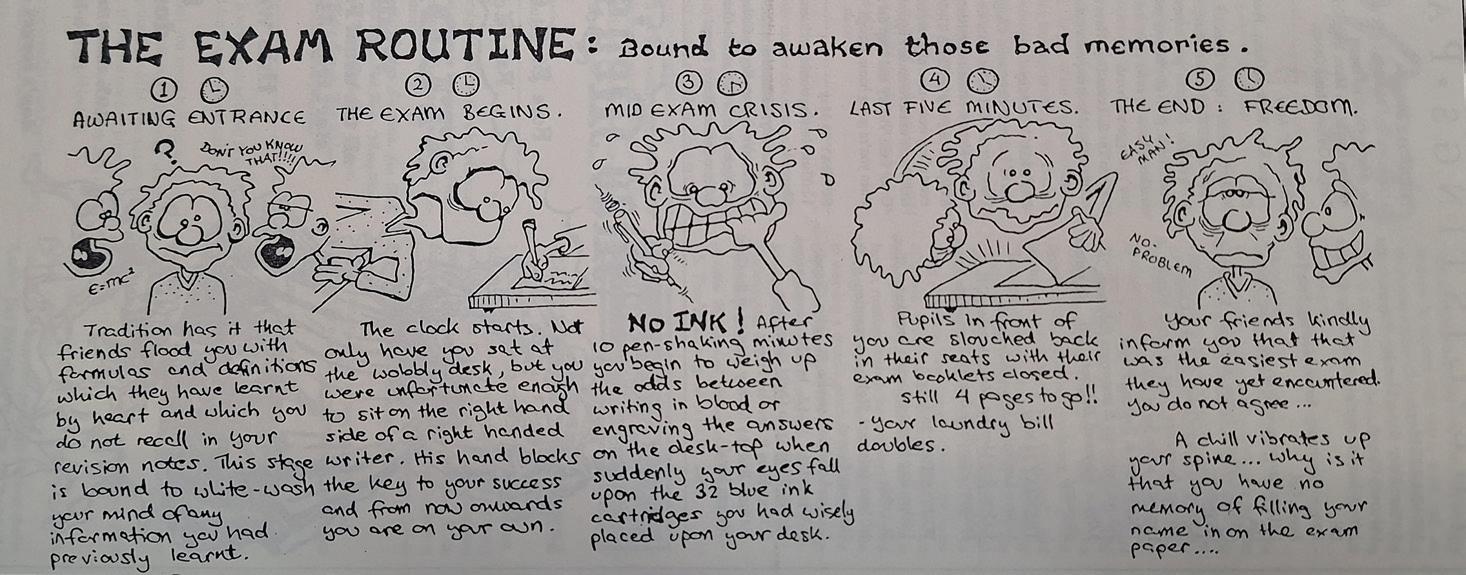


Across
1 Take a seat (3)
3 Type of coffee (9)
8 Word formed by the letters of another rag a man is one of it! (7)
9 Indicate (at someone, say) (5)
10 Melody (4)
11 Alienate sergeant (8) (8)
14 Smelt bad (6)
15 Of poetry (6)
18 Foreign representative amid plot (8) (8)
20 Mound (4)
22 Pungent edible bulb (5)
23 Dream picture (7)
24 Improvise (rap music, say) (9)
25 Louse egg (3)
Down
1 Strewn — desert cat (8) (9)
2 Apprentice — learner (7)
3 Race (8) — 4840 square yards (4)
4 Catch in a net — she-men (8) (6)
5 Face to face (2,6)
6 Extraterrestrial (5)
7 On strike (3)
12 Superb (9)
13 Trounces (8)— tells (a story, say) (8)
16 Coaching —teaching (7)
17 Group of related people (6)
19 Cost (5)
21 Barrier in a fence (4)
22 Postponed (3)




ISCIENCE EDITORS:
Eloise Shewring Hannah Woodley Livvy Mason-MyhillN a move to promote wild swimming, the British government has announced the addition of 27 designated bathing sites across the UK. This spans from Littlehaven Beach in South Shields to a wild swimming area only an hour away from Exeter; this being a River Dart Estuary in Totnes which could prove
to become a popular student swimming spot in summers to come! However, an increase in official bathing sites does not necessarily guarantee clean places to swim.
Designated bathing sites undergo testing by the Environment Agency throughout the bathing season, which runs from the 15th May to the end of September.
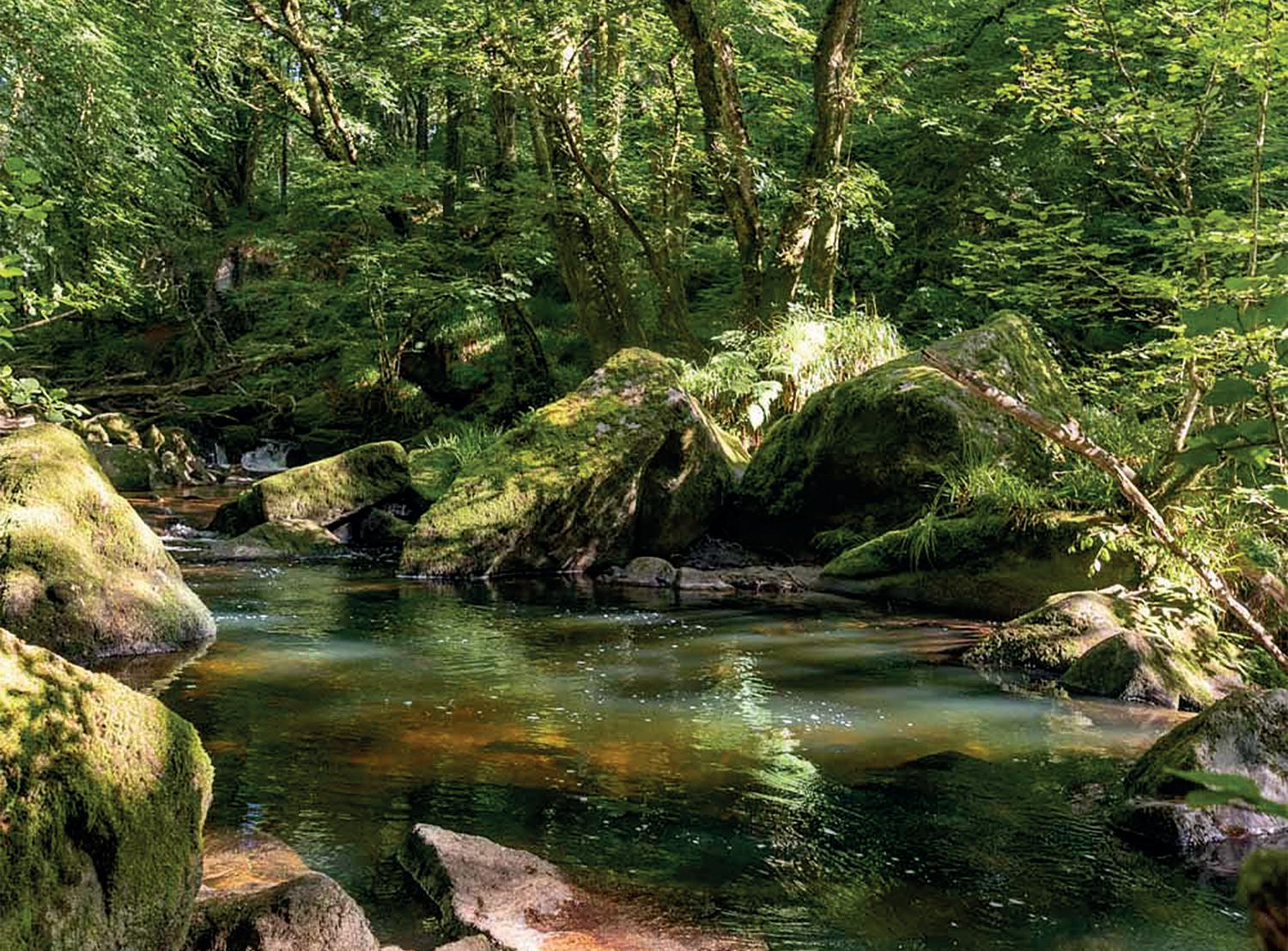
Last year, the summer pollution testing in the 423 bathing sites across the UK showed only 405 to meet the minimum standard of the Bathing Water Regulations, with the number of spots rated ‘Poor’ rising to its highest level since 2015. With an increase in summer pollution testing at this time of year, we can only expect for the poor quality results in water to return. When testing the water in these bathing sites, samples are taken, processed within 24 hours, and sent to an Environment Agency laboratory in Starcross near Exeter, where a team of scientists analyse them. Jonathan Porter — a microbiologist at the Environment Agency — explained the testing process: "We're looking for two different types of bacteria, E. coli and intestinal enterococci''. He then goes on to explain that these bacteria are tested because they indicate the possible presence of faecal matter in the water from various sources including humans, farm animals, birds, or dogs. The results found at the Environment Agency laboratory near Exeter are then published on their
Swimfo website and the sites with excessive bacterial levels receive a "Poor" rating, which results in advisory signs against swimming. According to the Environment Agency, there were 3.6 million hours of sewage spills into rivers and seas in 2023 compared to 1.75 million hours in 2022.

3.6 million hours of sewage spills into rivers and seas in 2023
With sewage spills only rising, it is difficult to expect this to change when new swimming sites are being designated in the UK. However, there has been an active effort to enhance the quality of water across the UK. Water Minister Robbie Moore has expressed his commitment to improve water quality across England’s coastal waters, rivers, and lakes for environmental and public benefit. This promise to improve water across England is usually done through close monitoring and placing permits for activities that may negatively impact water quality. Claire Roberston from campaign group Thames 21 supports Moore’s claims,
stating that, “if a designated water site fails, then the water company, local authority and the Environment Agency have to work together to improve that water quality.” Therefore, the rise of poor water quality alongside the designation of new spots may mean that we should expect to see some improvement in the new wild swimming areas in the coming year. However, this is not always the case. Wolvercote Mill Stream in Oxford is a good example of what may happen to the new bathing sites in the UK. The area was designated two years ago, and in both 2022 and 2023 it was rated ‘Poor’. If a bathing site is rated ‘Poor’ for five consecutive years, it loses its designation and testing regime. As England embarks on this largest ever expansion of wild swimming areas, the focus will be on monitoring and improving water quality to ensure safe and enjoyable experiences for swimmers across the country. Despite this, we can see in cases such as Wolvercote Mill Stream that new bathing sites do not necessarily imply a safe, good-quality swimming spot.
Livvy Mason-Myhill, Editor-in-Chief, discusses the science behind the incredible Northern Lights
EXCITED onlookers captured and shared stunning photos of the aurora borealis on the 10th May, visible across the UK, even reaching the south coast of England. Those who missed it on the 10th had another chance to witness the spectacle on the night of the 11th May. The lights appeared due to one of the strongest geomagnetic storms in recent years, leading the US National Oceanic and Atmospheric Administration (NOAA) to issue a rare solar storm warning. These storms increase the likelihood of seeing the auroras. The extreme geomagnetic storm on the 10th May was
classified as a G5, the highest level. Such intense storms have the potential to affect infrastructure, including satellites and power grids, as noted by the NOAA. The last significant G5 storm caused a power outage in Sweden, but no disruptions have been reported from this latest event. Ross Easton, a spokesperson for the Energy Networks Association, mentioned to the BBC that the energy sector prepares for various events, including those in space, and that space forecasts were being closely monitored over the weekend. Professor Carole Haswell, head of astronomy at the Open University, explained on BBC Radio 4’s Today

programme that many satellites rely on radio signals, which can be disrupted by the charged particles of a geomagnetic storm. This disruption particularly affects GPS systems used by planes.
The Northern Lights, or aurora borealis, appear as bright, swirling curtains of light ranging from green to pink and scarlet, caused by charged particles from the sun interacting with gases in Earth's atmosphere. Different gases produce different colours: oxygen emits green, the most common colour seen, while nitrogen glows purple, blue, and pink. The most spectacular auroras occur when the sun emits large clouds of particles known as Coronal Mass Ejections.
Clear skies on the night of the 10th May allowed for widespread sightings across the UK. Aurora activity was expected to continue on the 11th May, though the storm was predicted to be slightly less intense than on the 10th. Ideal weather conditions were anticipated again, with the best viewing times being after 22:30 BST.
The last extreme geomagnetic storm occurred in 2003, making the 10th May's event rare. Typically, the Northern Lights are seen only in northern parts of the UK, but there have been more frequent displays in southern regions recently. This
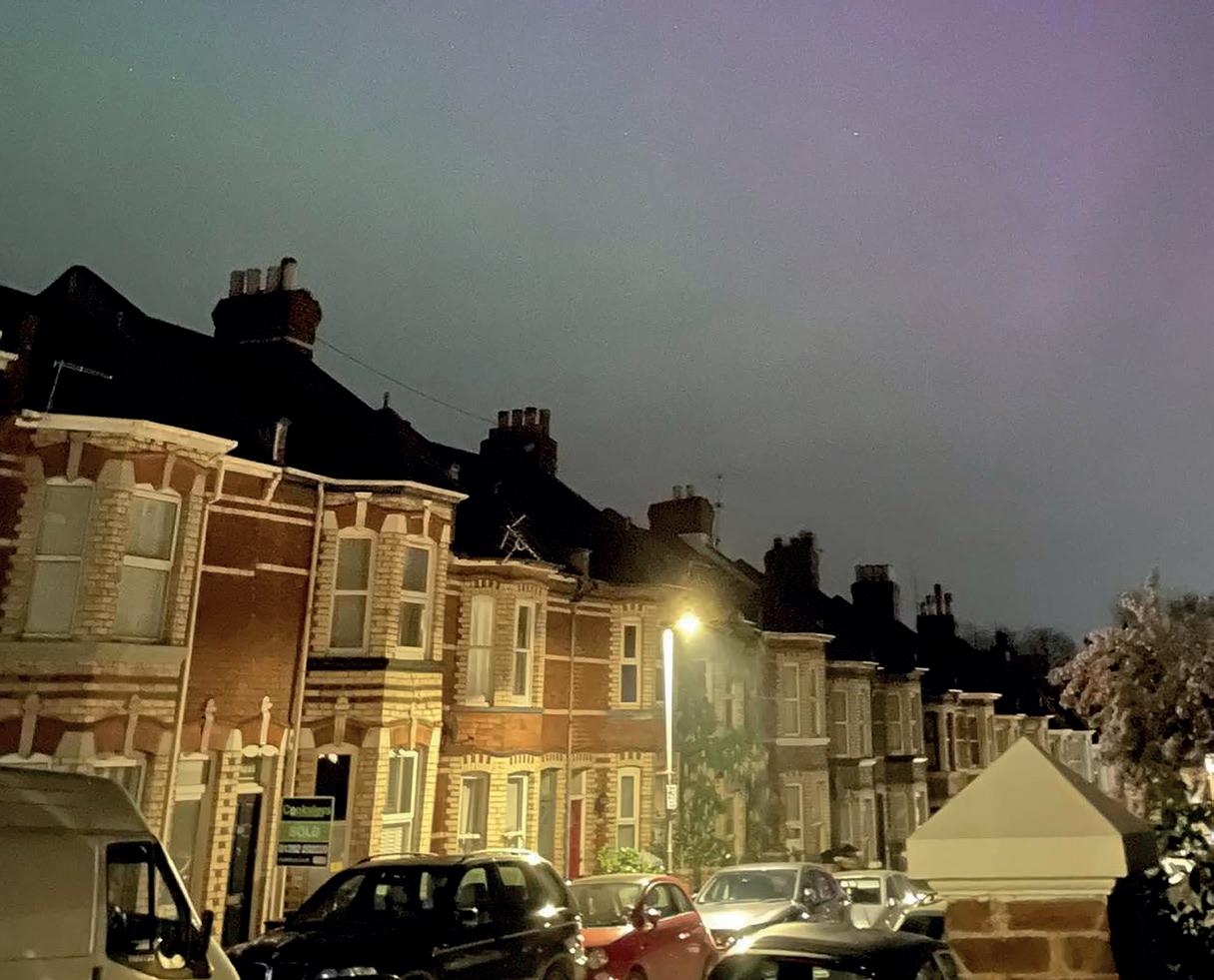
increased activity is due to the solar cycle approaching its 'solar maximum,' a period with more sunspots on the sun's surface. Sunspots, similar to massive volcanoes, release charged particles in Coronal Mass Ejections (CMEs), leading to more frequent and stronger auroral activity.
Improved forecasting and the prevalence of smartphones capable of capturing the lights have also contributed to more sightings in recent years. As always,
the best viewing spots are away from light pollution with a clear night sky. In the US, NOAA reported that the lights could be seen as far south as Alabama and northern California. Many northern European countries also enjoyed the spectacle, with bright pink skies over Austria, purple hues in Germany, and sightings in Slovakia, Switzerland, Denmark and Poland. Even in China, fuchsia skies were photographed in the north.
doing
AS an Associate Professor of Earth System Science at the University of Exeter, as well as the i newspaper’s environment columnist and author of ‘Fire, Storm and Flood: the Violence of Climate Change’, James Dyke is at the forefront of scientific and popular efforts to combat the climate emergency. He was kind enough to invite me into his office earlier this month to talk not only about the science, but how this overlaps with politics and society. Our conversation began by discussing governmental efforts to combat climate change. I asked Dyke whether he believes any government is currently getting it right on climate policy. He responded with a damning indictment of global leaders, stating that “no government anywhere has got any credible plans to limit warming to below 1.5°C or even 2°C, because no government is making any serious ef-
forts to rapidly phase out fossil fuels.”
I then raised an article Dyke had written in 2021 for The Conversation that called net zero a “dangerous trap”. He told me that “narratives around net zero have been used to pacify publics [and] to pacify society; to essentially say, ‘don’t worry, there is a plan’.” He specifically raised the issues of carbon credits, and carbon capture and removal technologies, which have been proposed as solutions to the climate crisis; Dyke condemned these as “woefully inadequate”. Consequently, Dyke described net zero as a “sugar rush”, and that in order to achieve these ambitious goals, “you actually have to stop burning fossil fuels, and there is little appetite to do that.”
This led me to ask whether there is any space for economic growth alongside climate action. Dyke suggested he did not think this was the case, arguing
that “the UK’s progress is grossly insufficient for the Paris Agreement targets”, which instead requires “a rebalancing of economies”. Dyke tied this into wider issues of social justice, stating that “I don’t think it’s a revolutionary idea to suggest that maybe we need to share the Earth’s finite resources a little bit more equitably.”
The Paris Agreement targets are a recurring theme in our discussion — in 2015, global leaders agreed to limit global temperature increases to well below 2°C above pre-industrial levels, and preferably below 1.5°C. When I asked him whether he believed the 1.5°C target was still achievable, Dyke said “it was never achievable with the policies proposed”, and that “there cannot be any more dispute that we’re going to crash past 1.5°C.”
Dyke did not understate the risk of a global temperature rise above 1.5°C,

Ipointing out that “1.5°C is an existential amount of warming for many people around the world.” For example, “for some people who live in low-lying island nation states it’s a bit moot whether it goes between 1.5°C and 2°C or 2°C and 3°C, because those people won’t exist because their homes will be underwater.”
Nonetheless, Dyke offered some hope for combatting the climate emergency when I asked him about how a government could implement effective climate policies. Dyke criticised the fact that, despite a consensus “for decades” on climate change within parliament, “that consensus has fractured over the past five years, because it’s become a political football”, such as with the British government granting licences for oil and gas extraction in the North Sea.
This led Dyke to state that there are “so many easy wins, there’s so much lowhanging fruit” on climate policy. He went on to state that “underlying all climate policy should be honesty and reality… the honest statement is that if we fail to avoid dangerous climate change, things are going to get worse, and difficult decisions need to be made.” He argues that it is politicians’ responsibility to communicate this to the electorate, rather than “persist in this phoney war against climate breakdown where you continually see grossly inadequate ideas being floated.”
We also touched on the University’s role to implement climate policies. Dyke felt that “the University has made tremendous progress on its scope one and two emissions” (which covers emissions generated by the organisation, or as a result of its consumption, such as electricity). However, he felt that the biggest issue for the University is “reducing its scope three emissions”, which covers things like travel.
Dyke has previously supported the student-led Shell Out campaign on campus, and in 2022 said the University’s partnership with Shell would “undermine not just the University’s reputation, but the futures of our students.” He echoed this in our interview, stating that “these fossil fuel companies are not climate champions — it sounds obvious, I can’t believe we need to say this.”
He went on to point out that, despite the argument that the University could help Shell transition away from fossil fuels, the reality is that “since the University accepted a significant amount of money from Shell, Shell’s action on climate progress has been going in the opposite direction… they are doubling down on oil and gas, they’re rolling back on their net zero targets.” He went on to state, “They are an oil and gas company that will continue to drive humanity towards catastrophe.”
Given much of our interview had presented a somewhat bleak perspective at times, I concluded by asking Dyke whether he thinks there are any reasons we should be optimistic in the face of the climate emergency. He responded that “vested fossil fuel interests would like nothing more than for us to abandon hope.”
“We always have to make a choice. One of the problems around some of the fatalism is that people assume that not only do you give up, but that what you do doesn’t matter anymore — and it does matter. We shouldn’t think about climate change in terms of targets or temperatures. It’s about well-being, harm and suffering, and the decision we’ve got to make right now is how much more suffering do we want to put in place as a consequence of our continued burning of fossil fuels. That’s the question. And there’s everything we can — and should — do about that.”
N a recent analysis using AI of 180 different vape flavours, it was found that these products contained 127 ‘acutely toxic’ chemicals, 153 ‘health hazards’ and 225 ‘irritants’. Nearly every flavour of vape was found to have at least one product that was classified as a health hazard, regardless of whether it contained nicotine. At the same time, it has been found that between January 2021 and August 2023, the percentage of the population using disposable e-cigarettes grew significantly from 0.1 per cent to 4.9 per cent.

Between January 2021 and August 2023 the percentage of the population using disposable e-cigarettes grew significantly
Vaping devices heat the liquid flavouring to a high temperature, producing an aerosol that is subsequently inhaled. They contain varying concentrations of vegetable glycerine, propylene glycol, nic-
otine, and flavourings. Previous research has even revealed that the heating process in various fruit-flavoured vapes, such as strawberry, melon, and blueberry, produces hazardous chemicals known as volatile carbonyls. These substances are known to have long-term health consequences such as chronic obstructive pulmonary disease (COPD), cardiovascular disease, and cancer. With so many chemicals used in tens of thousands of different vape goods, doing toxicity tests on each brand and flavour may take decades of research.
The research team at RCSI University of Medicine and Health Sciences, Dublin, conclude there is a “potential public health threat facing the 4.5 million vapers in the UK” and an urgent need for “enhanced restrictions” on flavours and regulations that are reflective of the health risks of vaping, especially for young people. Given the popularity of flavoured vapes among non-smoking teenagers and young adults, it is plausible that we are on the cusp of a new wave of chronic diseases that will emerge 15 to 20 years from now, due to these chemical exposures.
Referring to the rise in the appeal of
vaping among younger people, a spokesperson from the Department of Health and Social Care had stated that, “It is clear that flavours like cotton candy and cherry cola are deliberately being targeted at children, not adult smokers trying to quit, which is completely unacceptable.”
In January, the UK government announced that it would ban disposable vapes and restrict sweet and fruity flavours, with some experts even advocating for the government to go further and remove all flavours from vapes. However, earlier this year, researchers had found that a ban on disposable vapes could discourage the use of e-cigarettes among people who are trying to quit smoking, who might switch back to tobacco, which is supposedly more harmful.
But Professor Sanjay Agrawal, the Royal College of Physicians’ special adviser on tobacco, has said that while vaping can be a very effective way to break the addiction to tobacco, it should only be used for this purpose. “Vaping is not risk-free, so those who don’t smoke, including children and young people, should not vape either,” he said.

SUNDAY 19th May — the last day of the 2023/24 Premier League season — promised to be filled with chaos. Football fans were blessed this season with a three-way title race between Liverpool, Arsenal, and Manchester City. Seeing two teams battle for the top spot is always exhilarating, but having three teams vying for the champion’s trophy hasn’t been seen in recent memory.
The teams’ positions fluctuated from match week 21 onwards, but Liverpool held onto first place for the longest time, with eight weeks consecutively gripping onto the champion’s position. After a 2-0 loss in the Merseyside derby for Liverpool against Everton, and subsequent draws against West Ham and Aston Villa, it became mathematically impossible for Liverpool to be in contention of the title. Manchester City then pipped Arsenal.

The event was treated with immense care and responsibility
The sky-blue flag of Manchester City waved high as they achieved an unprecedented fourth consecutive title win, showing an impeccable run of form. They are the first side in English football history to boast this achievement.
Arsenal seemed likely winners, despite Manchester City consistently breathing down their necks. Ultimately, the North London team had to hope that City’s run
of good form would run out, allowing Arsenal to raise the trophy at the Emirates Stadium. Arsenal knocked on the door of every team, hoping that they would be victorious over the current champions.
First up was North London rivals, Tottenham. There was a lot of anticipation prior to this fixture. The teams recognised it as City’s final hurdle in the title race. For the Gunners, it was probably the first — and most likely last — time that they would cheer on for the Spurs to win a match. Arsenal would have had an 81 per cent chance of winning the Premier League had City lost this match, and a 75 per cent chance if the two sides drew.

The Spurs captain, Son Heung-min, had a brilliant chance to equalise and rekindle the hope for Arsenal. It was shocking that Son failed a 1v1, with keeper Stefan Ortega quickly able to squash Arsenal’s dreams. Football pundit, Jamie Carragher, shared his opinion that the moment Son missed his chance was the moment the title went from Arsenal to Manchester City.
Arsenal’s last chance for glory fell
onto the laps of fellow Londoners, West Ham United. The 2-0 win City picked up at Tottenham meant Arsenal headed into the final round of matches two points behind Pep Guardiola’s team. Arsenal did their part in beating Everton 2-1 on the final matchday despite the almighty defence the Toffees put up — Arsenal had to work hard. The Gunners desperately hoped City would drop points when the Hammers visited the Etihad, which would have crowned them champions.
Due to Arsenal’s superior goal difference, they just needed City to draw or lose their last match. Arsenal’s fate was in their rivals’ hands, and despite this rivalry, a win or draw against the champions would have been an extraordinarily difficult feat.
After Foden put two goals past Areola in the first half, Kudus shocked viewers with an incredible bicycle kick just before the half time whistle was blown. It was utter acrobatic awesomeness from the attacking midfielder, but it wasn’t enough for Arsenal.
West Ham, who finished the season in ninth place, picked up a nasty habit this season of conceding after half-time,

so it was unsurprising that City extended their lead in the fifty-ninth minute. Players and fans of Arsenal couldn’t hold back the tears as their Premier League campaign came to an end. The team’s efforts made it a record breaking season — they had the most wins and goals scored for an Arsenal team in a Premier League campaign, and the least amount of goals conceded by any team this season.
It is mentally tough for Arsenal after such a long, hard-fought, and close battle. This summer needs to be a reflective period for the team, and their second place finish needs to fuel their next season. 16 wins from 18 games… and they aren’t even champions! The Premier League is rife with talent, and Arteta’s side looks like they are in a good position for the next season with their young squad.

EVERY season at the start of a new Champions League campaign there is much debate and discussion over just who will lift Europe’s most prestigious trophy. Many guesses will have been unsurprisingly Real Madrid; the 14-time winners are one of the favourites to go all the way again, and they have duly delivered on such predictions thus far. Yet nobody saw the other finalist coming. They are currently fifth in their league, only just scraping Champions League football for the next campaign, and really have no superstar names amongst their ranks. The truth is, how have Borussia Dortmund found themselves here?

the fourteen-time winners are one of the favourites
Edin Terzic’s side go into the final at Wembley as massive underdogs. And that is still rather an understatement.
Led by the experience of Emre Can and Mats Hummels, their knowhow and teamwork have commanded them through the com petition, toppling more star-studded teams such as PSG in the semi-final, a club that always seems to falter in Europe, perhaps confirming the old adage the whole is more than the sum of its parts.

The solid unit of Dortmund combined with their attractive playstyle has allowed for many players to flourish, not least the flying fullback Ian Maatsen, on loan from Chelsea, and the revived Jadon Sancho, on loan from Manchester United. The core of exciting German talent like Nico Schlotterbeck
and Julian Brandt, together with the dependable striker Niclas Fullkrug, has also provided much success. This is a team in it together. But they are facing the most successful European team ever, who also happen to have arguably the best squad in the world too. Not an easy task. Real Madrid are serial winners, it is as simple as that. They find a way. The team boasts a talent of riches, epitomised by the deadly Brazilian forward duo of Vinicius Junior and Rodrygo. Both of them alone could win a trophy for you, but Madrid hold even more firepower. The mercurial Jude Bellingham has taken the football world by storm,
moving from Championship Birmingham to carrying the biggest club in the world on his back on several occasions this season, all in the space of just four years. He really is a phenomenon. And then there is the rest of the team. Experience is flooded throughout with the likes of Toni Kroos, Antonio Rudiger and Dani Carvajal, and this is merged with wonderkids such as Aurelien Tchouameni, Edouard Camavinga and Arda Guler. Throw in the incredible work rate of every single player,
epitomised in Federico Valverde, and the expert coaching of Carlo Ancelotti, and there really is no stopping them. I can only see this going one way. How can Dortmund snatch victory? Firstly, every player has to have the game of their lives. Defensively, they have to be perfect. The minimal chances they get, they have to take. It is an incredible ask, but perhaps the lack of pressure may just offer some freedom and calm, and the iconic yellow wall might just have Wembley rocking…

Sport writers tell us what upcoming competitions they are most looking forward to this summer
THE 17th edition of the UEFA European Football Championship commences the chronology of this summer’s major sporting events and comes first in the pecking order of most fans around the globe. Euro 2024 is certainly my personal favourite in the upcoming plethora of sports events. Rather unusually, the highly anticipated international competition comes at a reduced wait. 18 months after Argentina’s immaculate victory in Qatar and just under three years following England’s heartbreaking defeat at Wembley, the best countries around the continent assemble in the heart of Europe. With South America’s ‘Copa America’ making a simultaneous start, some of the die-hard supporters certainly won’t make sleep a priority in the months of June and July, with a tremendous focus on both competitions. However, the majority of people will certainly pick the Euros as the tournament to watch. With some of my friends and coursemates preparing for ‘international duty’, having laid claim to tickets for football matches all around the ‘Bundesland’, elements of jealousy will begin to creep in from my point of view. However, Euro 2024 can definitely be enjoyed without travelling to the host nation. After all, there are plenty of opportunities back home. Some will choose to remain in the warmth of the living room enjoying the top-quality football accompanied by the mesmerising, poetic commentary of Peter Drury. Others will make great use of beer gardens (or fan zones) in company with fellow supporters and the background noise of ‘Sweet Caro I most certainly will do both. Euro 2024 comes as a post-exam reward and, unlike the previoustional competitions, it will be watched in the summer sun, rather than in the back of unheated lec ture theatres (I’m sure you know what I mean).
Mikhail Shklover, Online Sport Editor
HE summer season is always a highlight for every sporting fan, but every four years the Olympics comes to town. Aside from having a fantastic opening and closing ceremony which present the hosting country’s culture to the world, the Olympics is known as the place of world records being broken. 2021’s Tokyo games saw Karsten Warholm (Norway) achieve a world record in the men’s 400m hurdles and Yulimar Rojas (Venezuela) overturning a 26-year-old triple jump feat. Track cycling saw multiple records being broken throughout the games, including three women's records within one day.
As well as the great amount of records that are broken, the sheer number 32 to be exact of sports that are in the 2024 games mean there is truly something for everyone. A personal favourite of mine is hockey, but regardless of your interest, the Paris Olympics will be available for UK viewers from the BBC. This is a stark difference to a lot of sport viewing, which is often behind a paywall. Especially for much younger followers, being able to access a wider range of sports they may not have otherwise seen proves the Olympics is much more than just sport.
Coverage on the Olympics would not be complete without talking about the Paralympics an area which celebrates an underrepresented community, and is part of what brings the games to be something that can be enjoyed by everyone.
Tom Langley

TEST cricket has not been on free-to-air TV since I was two, but one of the beauties of the format is that a Test series can be treated less as an event, more as a comforting, diverting backdrop to daily life. Listening to TMS while working (or maybe working while listening to TMS would be a more accurate description); scrolling through the comments below the reports of each day’s play; pondering selection for the next match; checking the forecast for Headingley next Tuesday (unpromising, but perfect conditions for swing if the rain holds off — win the toss and bowl?). There’s no feeling like getting home and refreshing the BBC website, at which point the infinite possibilities — a commanding partnership, a clatter of wickets — collapse into an often disheartening, sometimes spirit-lifting, reality.
The upcoming English Test summer brings as much intrigue as any other. England’s thrilling run of results under Ben Stokes did not survive the winter tour of India. Series against West Indies and Sri Lanka provide a chance for Bazball — England’s buccaneering style of play — to answer its critics. Meanwhile, the bowling attack needs renewing after James Anderson’s retirement, and there are questions over the identities of the wicketkeeper and spinner. England want to build a team for next year’s tour of Australia, but West Indies and Sri Lanka are formidable op ponents in their own right, as the former’s 1-1 draw in Australia earlier this year showed. England should win, as long as they maintain their focus on the present.

SUNDAY 5th May proved to be a figurative and literal changing of the tides for the 2024 season as Lando Norris celebrated his first win, toppling Verstappen’s clean sweep of race wins since losing to Carlos Sainz back in September. Norris’ victory arrived on his 110th F1 race, the Brit’s iron determination pulling him through for his maiden victory. He now sits in third in the championship, which will be celebrated in the McLaren camp. The Miami Grand Prix has injected elation into the atmosphere for the other teams. Verstappen’s dethroning in Miami, albeit a fall that was erased in the next race in Imola, arrived days after the shock departure of Red Bull’s Chief Technology Officer Adrian Newey, the mastermind behind arguably the most successful car in the sport’s history and definitely an integral component in Red Bull’s winning streak over the last few years. It’s a loss that has cast doubt into the future of Red Bull both in the short term and long term due to an already fractured support base for Team Principal Christian Horner following his harassment allegations.

The Miami GP has injected elation into the atmosphere for the other teams
Norris’ victory in Miami embodied the sentiment that perhaps Red Bull’s era as the unbeatable behemoth is coming to an end; still, only time will reveal if this fate comes to fruition.
Norris seized his win following a perfectly timed pit stop after a safety car was de-
ployed at half distance. Whilst this definitely presented the opportunity that led to his victory, it’s important to highlight the steady but indomitable momentum that Norris and McLaren have been aggregating over recent years. Miami’s celebratory crowning of Norris has been a peak amongst many high points for the 24-year-old; he has had eight second places throughout his short career, and his Miami win allowed him to finally break free of the anticipation of climbing past such a close margin. Everyone in the paddock was elated for

the McLaren driver’s first win, with Daniel Ricciardo running up to hug Norris as others crowded around. Verstappen was also keen to show his support despite the somewhat lacklustre performance he served as he congratulated Norris and accepted defeat, a moment that quashed any supposed bitterness from the reigning world champion.
By the time Norris had passed the chequered flag, he was almost eight seconds ahead of the Dutchman, a lead that signals incredible strength in his ability and a fantastic improvement to McLaren’s car following its recent upgrade package.
Losing out on what could have been a brilliant race was McLaren teammate Oscar Piastri. After the same safety car that aided Norris stunted his pace, his car faced front wing damage after a brief but intense grapple with Sainz. The result was zero points for the Australian driver.
On the brighter side, McLaren's strong performances in and after Miami brings them to 184 points in the constructors’ championship, a healthy 88 points ahead of Mercedes and 68 behind Ferrari. It’s a standing that remains worlds away from
Red Bull’s impenetrable 276 points, but it still signals the team’s ongoing progression. With this points increase and Norris’ dazzling maiden win, the Miami Grand Prix has proven that Formula One is shifting into a new era where Red Bull’s domination faces possible catastrophe. Regardless of this, one thing is for certain: Norris has solidified his position as one of the sport’s most promising drivers.

SPORT EDITORS:
Eloise Grainger Ben Scott
IT’S been a spectacular season for the University of Exeter’s Rugby Football Club, with teams ranking high on league tables and breaking records across the board.
The men’s 1st XV side made it to the finals for the third consecutive time and walked away as BUCS Super Rugby league season champions. With 18 wins, they set new records with a tally of 715 points and 111 tries, as well as suffering only three losses in league matches.
The women’s 1st XV side reached the semi-finals and finished second in the BUCS Women’s National League.
The Exeter men’s 1st team played against Loughborough University at the finals on the 17th April, where, despite a strong start, they weren’t able to recover being overtaken at the 19-minute mark, losing the match, whilst still winning the league.
They started the game kicking a penalty, then were tied when Loughborough did the same. Just three minutes after, Loughborough got ahead, giving them an advantage that Exeter wasn’t able to bounce back from. Exeter, however, didn’t go down without a fight; unfortunately, Loughborough came back swinging, declaring the half-time score 10-23.
Exeter attempted a comeback, but Loughborough followed up with more tries. Exeter continued to fight, scoring the last points of the match but, sadly, despite their valiant attempt, Loughborough won
the match with a full-time score of 31-35.
The women’s 1st team also played against Loughborough in the semi-finals on the 3rd April, playing neck-and-neck until near the end of half-time, after which they were unable to take back the lead after being overtaken at 39 minutes, losing the game and finishing second on the league table behind Hartpury University.

The game started strong for Exeter, scoring just two minutes into the match. Loughborough proceeded to do the same, tying the score; then, they were placed briefly in the lead following a successful conversion. Exeter continued to fight back, but it seemed their scores continued to be met, placing Loughborough in the lead at half-time with a score of 17-24.
Exeter made some points, but they were met with fierce opponents; despite scoring the final try and making the conversion, they weren’t able to recover from the disadvantage, cementing the win for Loughborough at 34-38 full-time.
However, these matches aren’t to be taken as examples of the teams’ abilities.
I attended the Varsity games in Sandy Park, both matches played and won by the men’s 1st team. The most recent took place on the 14th February and was the “Anglo-Welsh Clash”, against Cardiff University. Despite the rainy weather, the stadium was packed in support of Exeter’s
strong performance, where they barely allowed any scoring from their opponents.
Cardiff started strong, scoring just five minutes in and making the conversion: this would be their first out of only two tries in the game. Exeter then scored until half-time, placing them in the lead and marking the half-time score at 22-7.
Following a wonderful performance by the Exeter Emeralds cheerleading squad, powerful forwards allowed Exeter to gain and they continued to score, giving them a comfortable lead, followed by another try. The match finished with a try for Cardiff, followed by a conversion, finishing the game with a full-time score of 32-14 — a brilliant win for Exeter.
The earlier Varsity game, the “North vs. South Clash” against Durham University, took place on the 25th October. True to stereotypes, the English weather was once again rainy — this didn’t stop Exeter from powering through and leaving Durham in the dust.
Durham started in the lead. Exeter didn’t actually score until 29 minutes in, making a try and marking the last scoring made until half-time, leaving Durham in the lead at a half-time score of 5-10, at which point the Exeter Emeralds once again dazzled the packed crowd.
Following half-time, Exeter started to play stronger, placing them in the lead where they would stay for the rest of the match, and Durham would score the last points. The game ended with a try for Exeter and a successful conversion, declaring Exeter the winners of the
match with a full-time score of 24-15.
This season has been a remarkable demonstration of the incredible talent of the University’s rugby teams, with the Saturday Leagues XV placing high on the league tables, too, the men’s team finish-
ing 5th and the women’s team emerging champions. As players come and go with graduation and new recruits, we can only hope that the team will continue to be as good as they have been — I’ve got faith they will. #BleedGreen!
